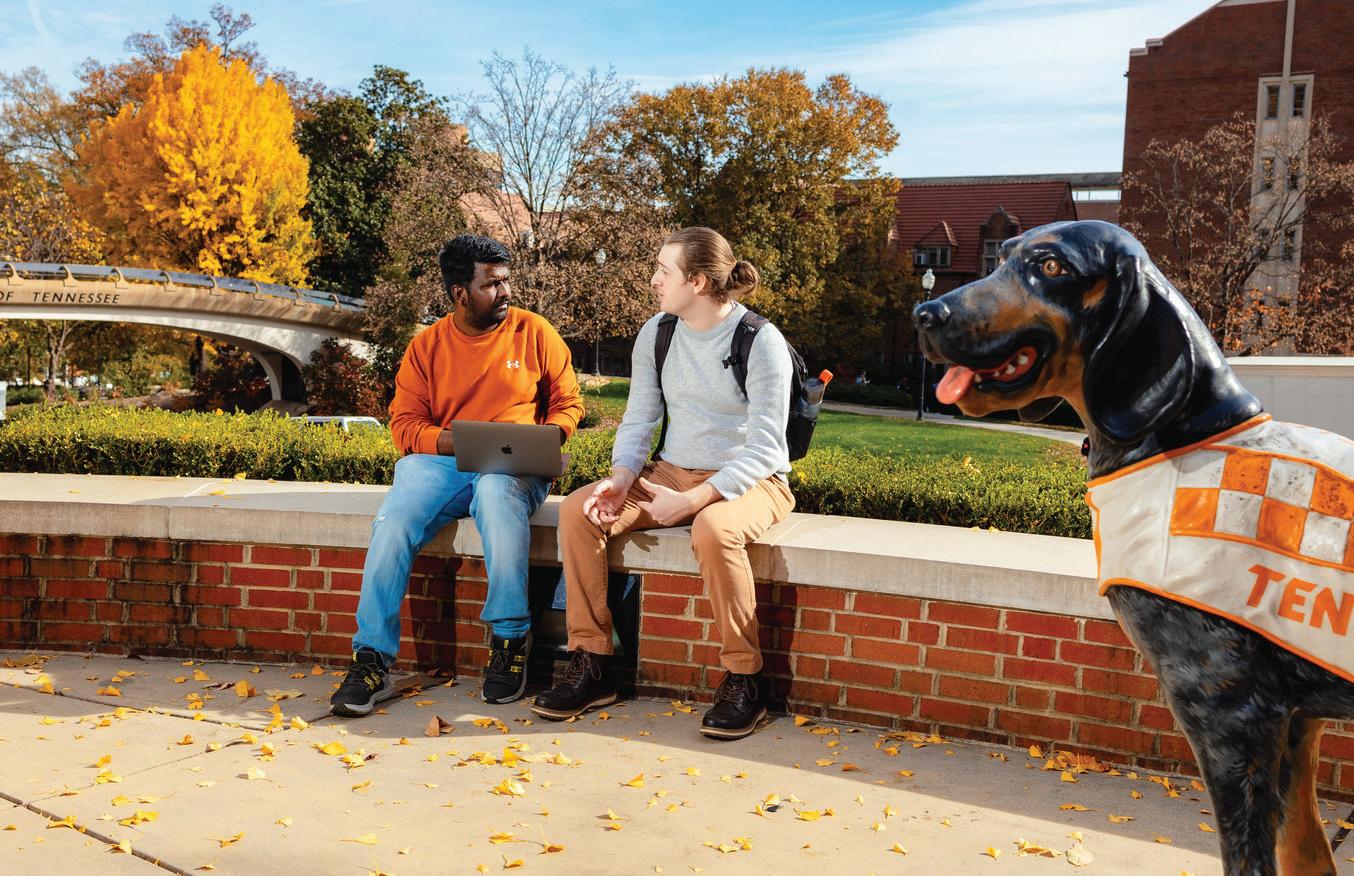




The University of Tennessee College of Social Work (UTCSW) annual report is called “eVOLve” because it captures the way that the College is growing and changing over time. A learning organization, the UTCSW is consistently assessing community needs, new trends, and emerging opportunities to reposition itself towards the future. Building on our strategic plan, we are seeing increased student success, alumni engagement, research impact, and overall vitality of the College.
This year, our College theme was empowering excellence. Our donors stepped forward in 2023 to help us continue our work and see new possibilities. With the help of a donor, we reinvested in our Social Justice Innovation Initiative (SJII), a seed grant program that enables faculty, staff, and students to partner with community agencies to realize change that furthers social justice ends. SJII projects in 2023 focused on voter registration, anti-bias training, vaccine access programs, youth empowerment, and reducing disparities in aging. A generous donor also created the Roger and Carol Nooe Chair, our first endowed chair. This endowment will support a nationally recognized scholar in clinical practice to improve mental health and wellbeing. A scholarship from the McNabb Center, the largest mental health provider in East Tennessee, will provide funding for a student with an interest in community mental health. The College has also invested in higher stipends for graduate research and teaching assistants, increased student financial aid, and doubled the number of students in paid field placements.
We hired leaders in our Nashville and Online MSSW programs (Drs. Allison Buzard and Rob Lucio) and our Office on Equity and Inclusion (Dr. Mary Gitau) to help us grow and develop these areas. In addition, new teaching, research, and field faculty hires expand our expertise in children’s and youth mental health, school social work, child trafficking, anti-racist pedagogy, and interventions with older adults and their caregivers, while building new expertise in international development and hospice care. The Social Work Office of Research and Public
Service (SWORPS), our applied research center, rededicated itself to its mission of serving the people of Tennessee, growing existing programs and taking on new research projects that help state and local entities effectively meet their goals.

You can see in this report that these investments of time, talent, and treasure are making a difference. They make a difference for our students, who are more likely to complete our programs and graduate with lower debt. They make a difference for alumni, who continue to thrive and work to effect change in our state and across the nation. They make a difference for UTCSW faculty and research staff, who are growing our research funding and strengthening the College’s impact across Tennessee and in our discipline. I hope you will enjoy reading about our successes and find yourself inspired to be part of the UT College of Social Work’s eVOLution!

Lori Messinger, Dean
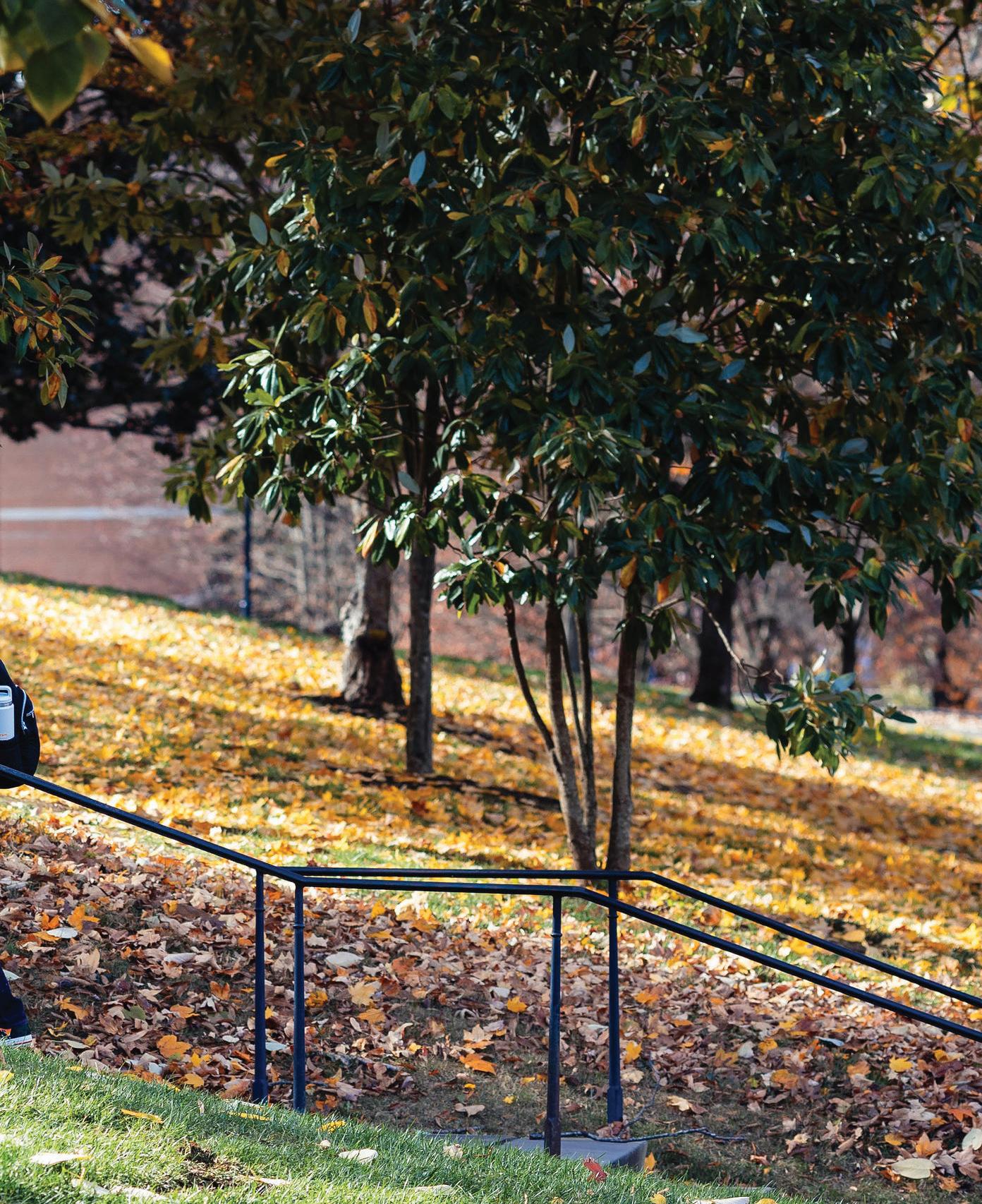
Building on our strategic plan, we are seeing increased student success, alumni engagement, research impact, and overall vitality of the College.”
— Dr. Lori Messinger Dean of The University of Tennessee College of Social Work
In 2022, the UT College of Social Work launched a new strategic vision for our future. Our commitments included enhancing the workforce, expanding our impact, engaging stakeholders, ensuring equity, and empowering sustainability.
Here are a few highlights that showcase our progress in each area.
Preparing ethical, effective, highly skilled social workers for Tennessee and beyond.
STRATEGY
Increase enrollment in our MSSW online program by 10% annually.
MSSW ONLINE PROGRAM ENROLLMENT BY THE NUMBERS:
FY ‘22 | 109
FY ‘23 | 98 -10% YOY FY ‘24 | 119 +21% YOY
CELEBRATING
15 YEARS
Continuing to develop and support research that makes a difference.
STRATEGY
Increase the amount of new external grant funding based on a three-year moving average.
AMOUNT OF NEW EXTERNAL GRANT FUNDING:
20.6M
9.9M
CSW MSSW ONLINE PROGRAM FY ‘22
‘23
STRATEGY
Increase the percentage of tenure track and research faculty submitting proposals as principal investigator (PI).
PERCENTAGE OF TENURE TRACK & RESEARCH FACULTY SUBMITTING PROPOSALS AS PI:
STRATEGY
Increase and maintain a retention rate to a minimum of 95% for our BSSW and MSSW students.
COMBINED RETENTION RATES FOR BSSW AND MSSW PROGRAMS: FY ‘22 | 92% FY ‘23 | 94%
STRATEGY
Maintain above an 85% LMSW licensure passage rate annually.
LICENSURE PASSAGE RATES: FY ‘22 | 85% FY ‘23 | 92%
STRATEGY
Increase the number of research publications by UTCSW faculty and PhD students.
RESEARCH PUBLICATIONS: FY ‘ 22 : 5 %3 F Y ‘23:71% 69 75
‘22 FY ‘23
Maintaining vibrant, mutually beneficial connections to alumni and community partners.
STRATEGY
Enhance alumni support and outreach.
INCREASE THE NUMBER OF ACTIVE ALUMNI AT EVENTS:
Being a destination workplace where all people are respected, supported, mentored, engaged, and can thrive.
STRATEGY
Increase doctoral GRA stipends.
INCREASE THE DOLLAR AMOUNT OF GRA DOCTORAL STIPENDS:
STRATEGY
Leverage resources to support collaborative research and community engagement.
INCREASE EXTERNAL UNIVERSITY COLLABORATIVE PROPOSALS (CSW & CBHR ONLY):
STRATEGY
Incentivize, fund, and evaluate collaborative projects with community partners, especially those that serve historically marginalized communities.
ESTABLISH PARTNERSHIPS WITH SIX NEW COMMUNITY AGENCIES ANNUALLY:
STRATEGY
Improve employee engagement.
EMPLOYEE ENGAGEMENT SCORE BASED ON MCLEAN SURVEY DATA OCTOBER OF EACH FY:
STRATEGY
Raise funding to maintain the Social Justice Innovation Initiative (SJII).
MAINTAIN FUNDING TO SUPPORT SJII:
For updates, visit our Strategic Vision Results page on our website at: csw.utk.edu/strategic-vision-and-results/
EMPOWERING SUSTAINABILITY:
Expanding and diversifying revenue sources and strengthening business services.
STRATEGY
Increase endowments made to the college to support students, faculty, research, and community outreach.
INCREASED ENDOWMENTS:
119%
IN ENDOWMENT
STRATEGY
Diversify revenue income by increasing the number of credit, and agency-based continuing education certificates and programs.
INCREASE REVENUE FROM CONTINUING
Revise and assess business practices to ensure efficiency and effectiveness.
REVIEW TWO PROCESSES QUARTERLY ACROSS THE COLLEGE BUSINESS OFFICE TEAM:

In a groundbreaking moment for its 81year history, the college announced its inaugural endowed chair in February 2023. This visionary initiative was brought to life by the extraordinary $2 million gift from Phillip and Janet Lawson. “We are thrilled to announce this landmark gift,” said UTCSW Dean Dr. Lori Messinger. “An endowed chair will enable us to attract a top scholar to the college who can help move
the needle on mental health practice in East Tennessee and nationally.”
The chair was established to honor Dr. Roger Nooe and his wife, Carol. Dr. Nooe, Professor Emeritus at the UT College of Social Work, began his career at UT in 1975 as Knoxville Branch Director and Associate Dean. A longtime Knoxville scholar and therapist, he has worked tirelessly to strengthen the community’s response to homelessness, mental illness, and other challenges facing local families. He retired in 2005 after 30 years of teaching, mentoring and inspiring students.
Dr. Nooe graduated from Maryville College and has MSW and PhD degrees from Tulane University.
In addition to his long career at UT, his experience includes positions on the faculty of the University of Kentucky, and with the Kentucky Department of Mental Health, Bluegrass Comprehensive Care Center, Cherokee Health, and in private practice and program consultation.
For over 25 years, Dr. Nooe has actively researched homelessness and authored
biennial reports on Knox area homelessness. Dr. Nooe chaired the Mayors’ task force to develop the Ten-Year Plan to End Chronic Homelessness and later served as the director of the implementation office for the plan. He was the first president of the Knoxville–Knox County Coalition for Homelessness.
Dr. Nooe helped to establish the Public Defender’s Community Law Office and served as its director of social services. The program was one of the first of its kind in the country and serves as a model for other public defender’s offices nationwide. He has been a consultant for CAC and Americorps and served on numerous community boards, including Legacy Housing Foundation, Cherokee Health Systems, East Tennessee Mental Health Association, and the Symposium for the Advancement of Family Therapy.
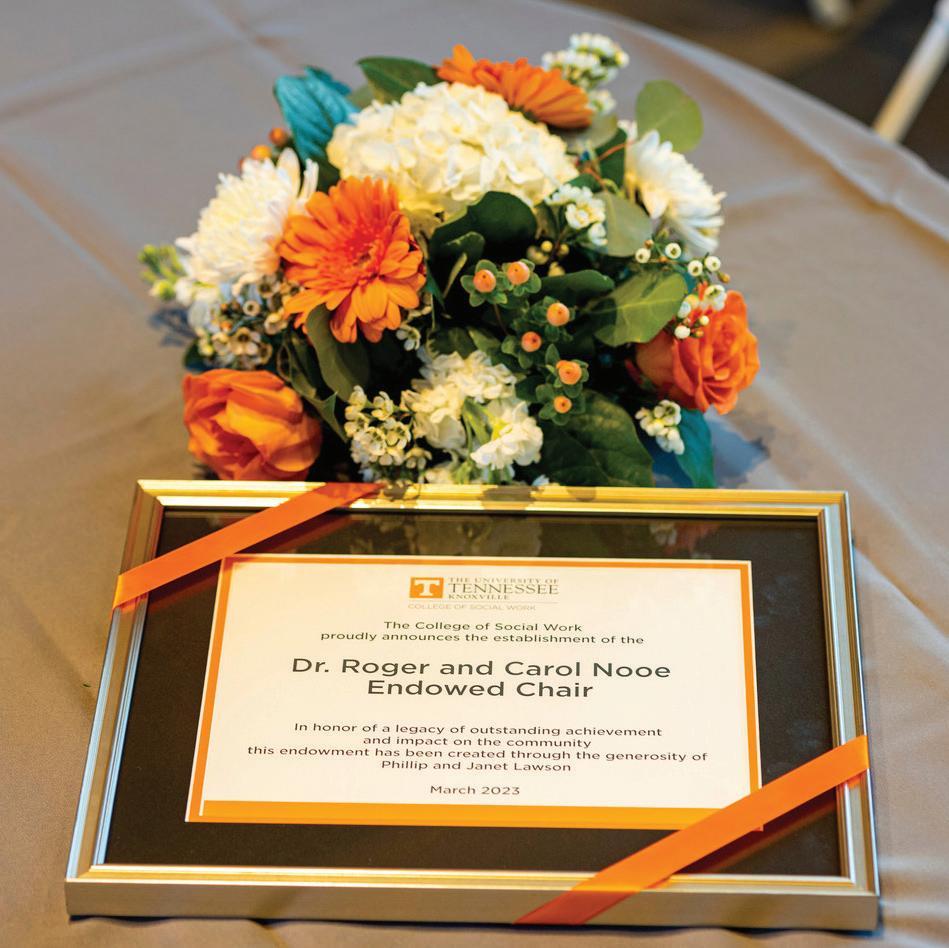
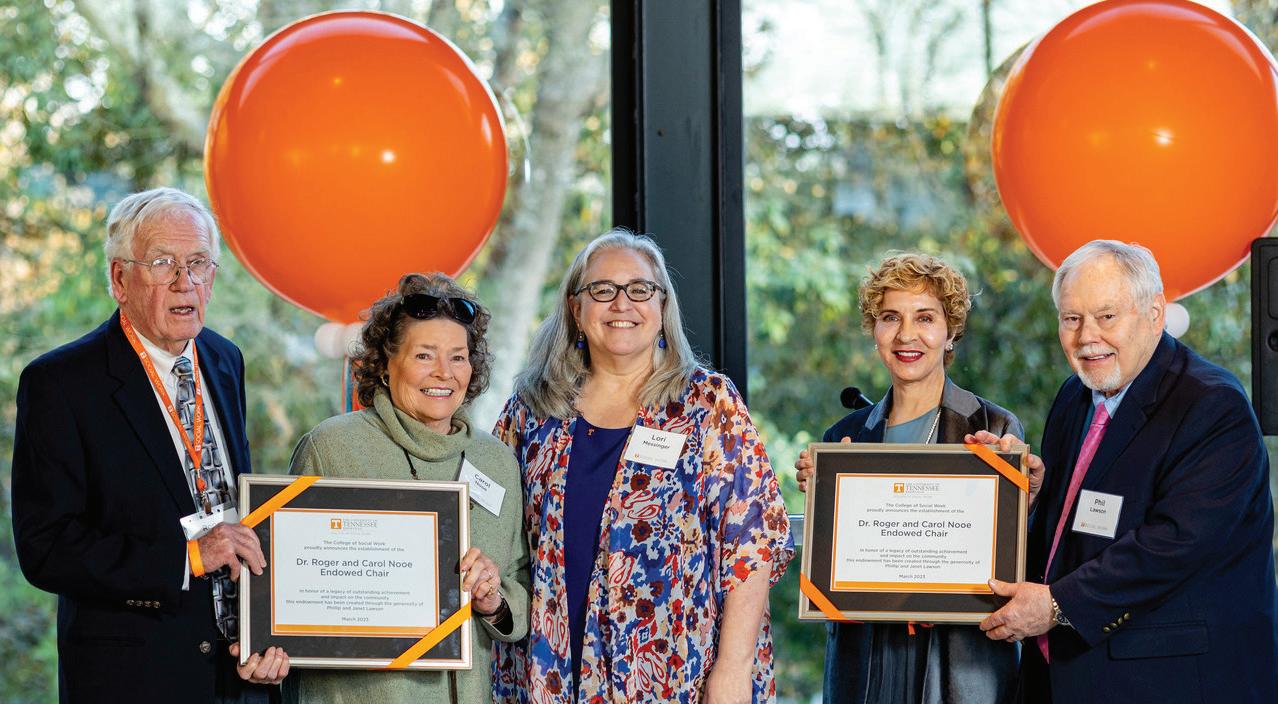
Among the many awards Dr. Nooe has received are the NASW Knoxville Branch Lifetime Achievement Award in 2016 and the UT College of Social Work’s Heart of Social Work Award in 2008. He was also honored twice with the UT National Alumni Association’s Public Service Award in 1987 and 2003.
Carol Nooe is a graduate of Maryville College and founder of Nooe’s Interiors, a noted interior design firm. She has
generously contributed her talents to numerous community projects, including the renovation of Minvilla Manor, which offers supportive housing in Knoxville, as well as the Knox Area Rescue Ministries and Flenniken Landing.
“We are happy to recognize Roger and Carol’s outstanding achievements and their impact on the university and the community,” said Phillip Lawson. “Roger played a key role in the growth and development of the College of
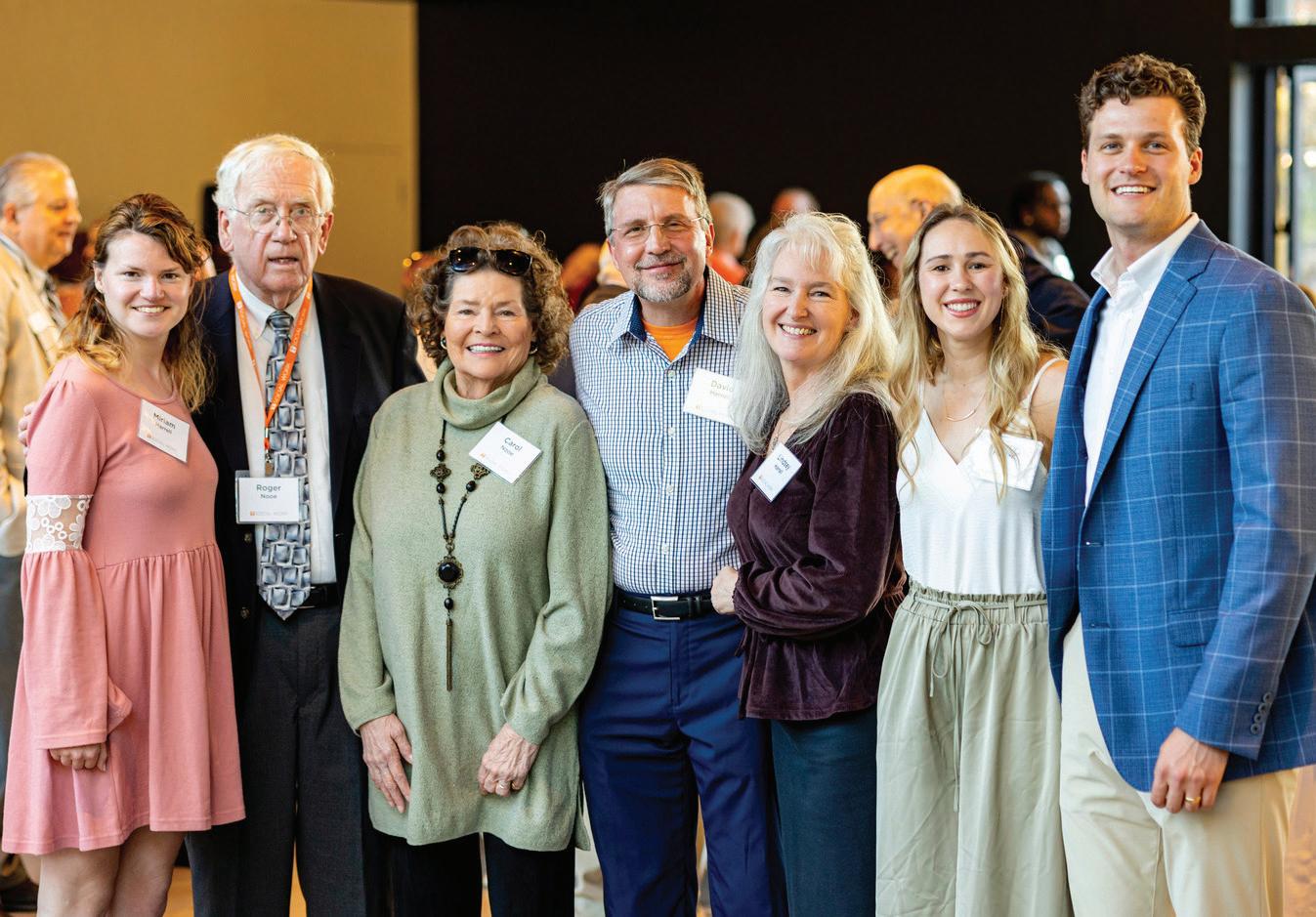
Social Work. Today, its graduates improve the lives of children, families, and people in need across the state and region. We’re proud to support this important work.”
Both Lawson, Nooe and their spouses were recognized at a formal reception hosted by the College of Social Work at the Knoxville Botanical Gardens.
The Endowed Chair will be announced in 2024.
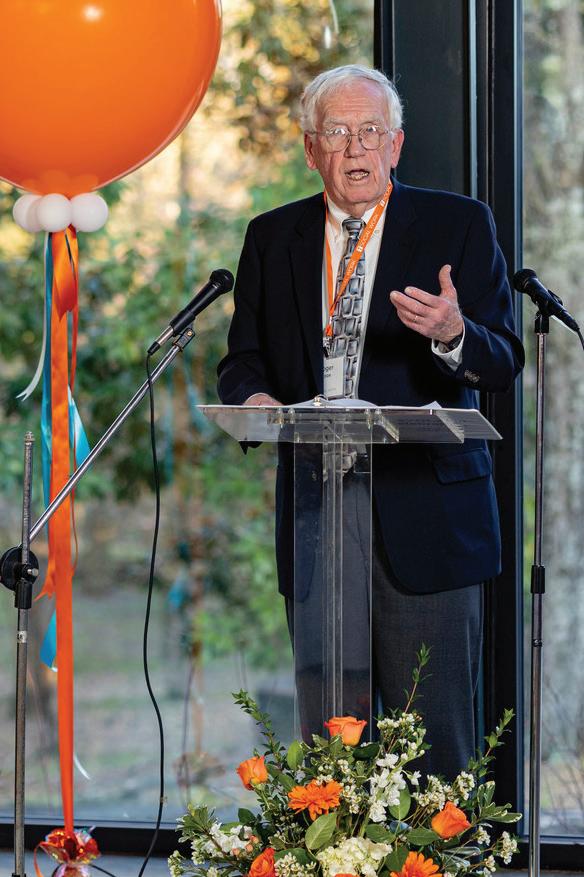
By Angela C. Thomas
Social Work Office of Research and Public Service (SWORPS) is the community outreach arm of the College of Social Work at the University of Tennessee, Knoxville.
For nearly 50 years, SWORPS has partnered with public, private, and nonprofit organizations to leverage research, technology, and human connection to advance their mission of improving lives in Tennessee and beyond.
In 1975, the Office of Continuing Social Work Education (OCSWE) was established within the UT College of Social Work to provide specialized professional education for practicing social workers and to provide research and evaluation services to mostly government-funded programs. In 1980, OCSWE was renamed the Social Work Office of Research and Public Service, SWORPS, and, over the last several decades, the diverse, talented, and deeply
committed employees have provided a wide array of services to public, private, and nonprofit organizations both within Tennessee and nationwide.
The Tennessee Child Support Employment and Parenting Program (TCSEPP) is one of the many services SWORPS provides. Since July 2023, the program has expanded across the state with an additional presence in Middle and West Tennessee. TCSEPP’s goal is to help families. Parents express a sense of well-being when they have opportunities to thrive financially, they experience physical and mental health, and their children demonstrate educational success and are secure and happy. Navigating the child support system while looking for a job and establishing a healthy and strong relationship with their children is difficult for some parents. In partnership with the communities they serve, TCSEPP provides a wide array of comprehensive, trauma-informed, evidence-based services
to parents involved with the child support system to enhance their sense of well-being and help them and their children thrive.
Another important service SWORPS provides is the Joint Task Force on Children’s Justice and Child Sexual Abuse (JTF). The JTF, a multi-disciplinary group of child welfare professionals, develop a plan and implement recommendations for improving the prevention, investigation, prosecution, judicial handling, and treatment of cases of child sexual abuse and exploitation, and other forms of severe child abuse and neglect.
The impact of the JTF program is farreaching. From creating a “What Happens in Dependency Abuse and Neglect Cases in Juvenile Court” booklet to help child welfare and justice professionals prepare children for appearing in court, to developing an Erin’s Law guide to help Tennessee public schools, childcare agencies and other organizations that serve children and youth with resources for providing age-appropriate instruction related to child sexual abuse, the SWORPS JTF staff respond to severe child abuse and neglect cases and address the child protection needs of their communities.
In addition to programs in child services, the Knoxville, and Knox County Homeless Management Information System (KnoxHMIS) provides an empirical window into homelessness, providing data collection systems, outcomes analysis, and technical assistance to inform policy and program development for the benefit
Applying science, rigor, and creativity to meet unique partner and client needs. INCLUSION
Equipping programs and decision-makers to provide equitable access to opportunities and resources.
Informing action with curiosity and understanding.
Building authentic relationships that power shared success.
Exemplifying transparency, accuracy, and the highest standards of professional ethics.
of persons experiencing homelessness in the area. Along with serving as steward of the Knox community's Homeless Management Information System (HMIS), KnoxHMIS facilitates the Coordinated Housing Assessment Match Plan (CHAMP), the local Coordinated Entry System. CHAMP is an inter-agency collaborative system built to assess and prioritize the most vulnerable unhoused clients and match them with appropriate housing and support.
Each year, SWORPS provides and manages homeless service data for an estimated 10 federal, state, and local funders; 20 agency partners; 75 homeless service projects; and 8000 unhoused or precariously housed neighbors. The impact of KnoxHMIS provides ongoing community benefits such as clarified understanding of Knox homelessness, informed strategic planning, improved care coordination, and mobilized funding.
Recently KnoxHMIS & CHAMP conducted a needs assessment which helped the Knox community secure the Youth Homelessness Demonstration Program (YHDP), an annual infusion of over $900,000 in federal funds to prevent and end youth homelessness. By partnering with the UT College of Social Work to conduct an 18-month statistical analysis of equitable housing outcomes by race and gender, the study led to the termination of the Knox community's existing vulnerability index (the VI-SPDAT) and the development of a new, more equitable assessment tool. The SWORPS KnoxHMIS team will work to continue fostering a greater understanding of the social consequences, human impact, and other deleterious effects of homelessness.
Looking ahead to the next 50 years, the College of Social Work and the Office of Research and Public Service will maintain an active partnership and will continue applying science, rigor, and creativity to meet the unique needs of the communities and the people who reside in them.
As you look back over your first year as Director, were things as you expected?
"I came to SWORPS expecting to facilitate growth, but I wasn't expecting that we would do so much so quickly! Managing growth is now our current focus at SWORPS."
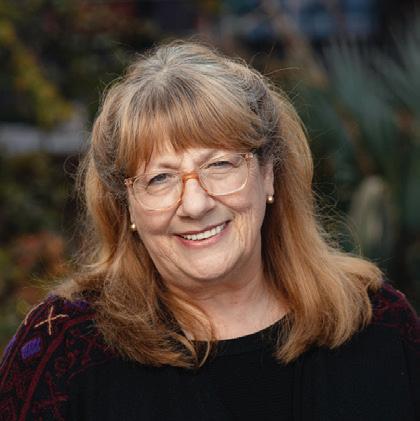
What things do you feel have been accomplished in that time?
"We've accomplished a great deal over the past year. We've created a clear agency structure that reflects our mission. We are working now on the infrastructure—the processes, policies, procedures, physical and digital assets, and resources needed to enhance our performance effectiveness and efficiency, and our responsiveness to funder needs. We've significantly expanded two major projects, added at least four major projects and multiple smaller projects, and almost doubled the size of our grants and our staff."
"As we grow, we have been intentional in developing strategies for fostering a culture of connection within SWORPS to facilitate innovation, engagement, and performance excellence."
"We are firmly establishing SWORPS as UTCSW's statewide community impact arm and have revamped our website to better reflect who we are, what we do, and why."
What are your plans as you look ahead to year two, three, and beyond?
"We want to invest in business intelligence (BI) and analytics to help us manage growth by providing us with insights and tools that facilitate decision making, improve customer service, increase productivity, optimize effort, track resource usage, and plan for the future. We also want to explore leveraging generative AI and data storytelling to generate new ideas, insights, and solutions for issues our sponsors grapple with, as well as streamlining our data collection, integration, analysis, and reporting processes and tools, fostering a data-driven culture at SWORPS that encourages innovation and creativity."
How are you settling into Knoxville? Has your wardrobe incorporated more orange within the past year?
"I've been so busy that I really haven't had a chance to 'settle' into Knoxville! I spend a great deal of my day in Zoom sessions with staff and sponsors statewide or travelling across Tennessee to meet with staff and/or attend sponsor events. I have, however, incorporated quite a bit of orange into my wardrobe over the last year—though, I must admit that my preference is for Smokey gray!"
By Angela C. Thomas
The Social Justice Innovation Initiative (SJII) has been shaping and elevating the conversation surrounding social justice issues through creative partnerships between faculty, students, and community organizations since 2018. Thanks to a generous five-year donation from longtime College of Social Work (CSW) supporter Susan Cooper, the SJII fund established a platform to effect change that has realized years of impact in the college, the university, within the Knoxville and Nashville communities, and throughout greater Tennessee. SJII offers a unique framework of seed funding for faculty, staff, and students to partner with community organizations to address local needs, giving students opportunities to put their knowledge and skills into practice while making a difference. This innovative approach has allowed the college to be on the forefront of addressing many of society’s most pressing issues around education, health and well-being, civic engagement, and social and economic prosperity.
“I am proud that the SJII partnership, envisioned seven years ago, continues to have an impact in Tennessee and beyond,” Cooper said. “The vision to provide members of the College with opportunities to make a difference has far exceeded my expectations.”
Over the initial five-year timeframe, comprised of $75,000 per year, the fund enabled faculty, staff, and students in the CSW to promote many aspects of social justice, specific to a
new theme each year. During the inaugural launch in 2018, the focus area was to challenge racism. Funded projects included increasing voter engagement among Knoxville’s young adults of color and developing the Coalition of Black Social Workers, a student organization aimed at increasing diversity within the college while developing relationships that address racism. Additionally, the CSW used the fund to support two nationally recognized speakers: Austin Channing Brown, author of I’m Still Here: Black Dignity in a World Made for Whiteness, and Nikole Hannah-Jones, award-winning investigative reporter and writer for the New York Times and author of the renowned 1619 Project
As students, faculty, staff, and community partners witnessed the initial impact of the SJII, interest grew and applications for project funding increased. In 2019, the focus expanded from challenging racism to include challenging sexism. Faculty, staff, and students attended the Nancy A. Humphreys Campaign School at UConn, a project that teaches social workers how to campaign for themselves, how to work on a campaign, and how to effect change in the Tennessee Legislature and beyond. The campaign school was a huge success, and the partnership with the Campaign School continues today. Another project sponsored a group of CSW students to attend the Student Action Committee on Racism and Sexism at the National Conference on Race and Ethnicity (NCORE) in Portland, Oregon.
A third project supported a three-weekend training at the Highland Center for students and community organizations to further approach their work from a transformative justice and intersectional perspective with skills for social change. The SJII also hosted two insightful lectures: “Images of Intersectionality” by Danica Roem, the first openly transgender person elected to the Virginia General Assembly; and “Food, Bodies & Liberation,” by Syd Yang, a mixedrace, queer, non-binary writer, healer, and intuitive counselor who taught participants to use an intersectional, feminist and liberationcentered approach to whole body wellness for people of all genders.
As the world shut down due to the pandemic, the Social Justice Initiative projects used technology to meet their objectives. Two podcast series were launched — one within the college, hosted by faculty and students; and one with Knoxville community partner, The Bottom, a Black community space and bookstore. A youth photovoice project enabled high school students from across Knoxville to tell their stories through photography and address the racism they experienced within their lives. Another faculty and student team partnered with a mental health provider network to create a website, “Providers Supporting Immigrants,” and training for providers to support immigrants in immigration court hearings. “Despite the pandemic and all the challenges that came with it, I am proud that those dedicated to
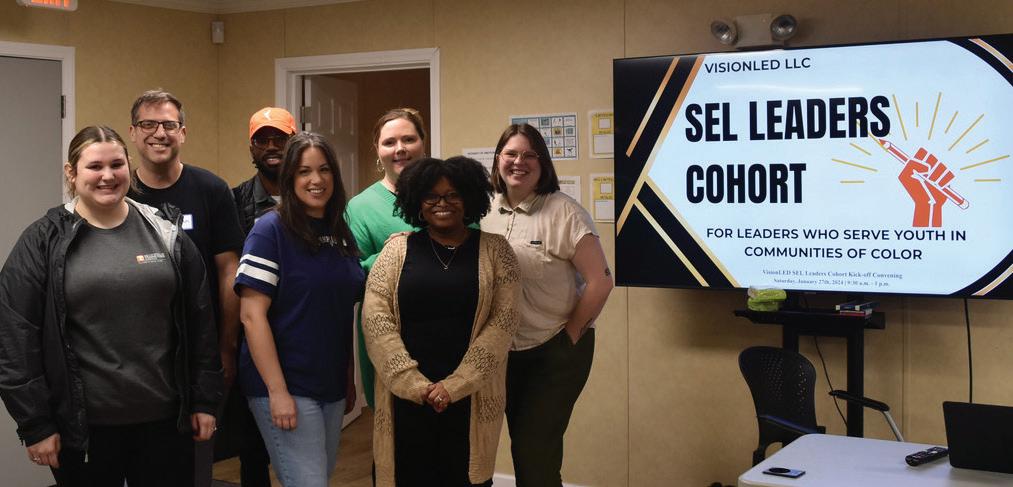
the SJII stayed steadfast in their work,” said CSW Dean Lori Messinger. “Rather than use the pandemic as an excuse to back off, our supporters became even more diligent in getting the initiatives fulfilled. This speaks directly to the level of commitment of social workers in general.”
In 2022, the field faculty hosted an AntiBias Learning Collaborative for field instructors, students, faculty, and staff. SJII also supported the city of Knoxville, who adapted the SJII structure for a new Mayor’s Social Innovation Challenge for collaborative projects supporting youth and community resilience. There was also a student-led voter registration project on Nashville and Knoxville campuses.
That same year, two of the previously funded projects were established as statewide 501c3 nonprofits: The Coalition of Black Social Workers, and (providers) Serving Immigrants (SI).
When 2023 started to return to (a new) normal, the SJII was once again going strong with five funded projects. A new Campaign School for Social Workers presented a two-day workshop on becoming politically knowledgeable and active as a candidate, staff member, or volunteer. A one-day, inperson training on “Inclusive Practices for Serving Youth” highlighted issues of gender and racial bias in services to youth and trained attendees on inclusive practices for serving youth, especially youth of color and LGBTQ+ youth. Another project, “VAC Impact-New Directions Health Care Solutions,” worked to improve vaccine access to underserved communities. “Empowering Youth” aimed to mitigate the barriers of systemic racism, acknowledging the need for a social-emotional learning curriculum that is trauma-responsive and culturally competent. And the “Aging Rainbow Coalition” worked to improve healthcare knowledge and reduce disparities for older LGBTQ+ persons living in the Knoxville area.
While the college heads into 2024, new initiatives will continue with a broad approach to social justice, focusing on racism, sexism, and intersectionality. Tony Murchison, Director of Outreach and SJII Coordinator noted, "There is much work still to be done, but with the help of donors, students, faculty, and staff, the Social Justice Innovation Initiative remains committed to many more years of fighting injustice at the grass-roots level."
I am proud that the SJII partnership, envisioned seven years ago, continues to have an impact in Tennessee and beyond.”
— Susan Cooper, CSW Supporter
As Cooper’s initial investment in the SJII saw a rich and productive fulfillment, CSW supporter Phil Lawson made a generous gift of $100,000 to foster continued growth of this important work. “The Social Justice Innovation Initiative addresses critically important issues in our society,” Lawson said. “I’m happy to support the collaboration of social work students, faculty, and staff as they partner with community organizations to create meaningful change.”

Knox Pride, and South
to create the Aging Rainbow Coalition (ARC), which provides trainings and opportunities for connection among members of the LGBTQA+ population age 55 and older.
Associate Dean Dr. Kristina Gordon Takes on New Role to Lead Enhanced Engagement Efforts
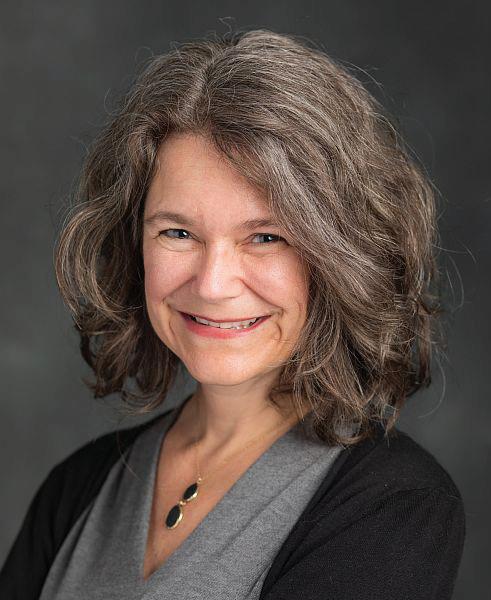
The UT College of Social Work (CSW) has combined efforts with the College of Education, Health, and Human Sciences (CEHHS) in an attempt to strengthen UT’s engagement in community service across Tennessee. Dr. Kristina Gordon will serve as Associate Dean for Community Engagement for CSW and CEHHS. She officially assumed the role on July 1, 2023.
In her new role, Gordon will elevate and align UT’s engagement efforts with community partners to enhance health, education, and quality of life in Knoxville, East Tennessee, and statewide. She will serve both CEHHS and CSW as Associate Dean, spending 60% of her time with CEHHS and 40% with CSW.
US track and field Olympian Tianna Madison graduated with a Bachelor of Science in Social Work (BSSW) degree from the University of Tennessee, Knoxville, online program. As an entrepreneur, mother, and professional athlete, Madison felt UT’s BSSW online program would be the best option to help advance her career in social work due to the benefits of remote learning.
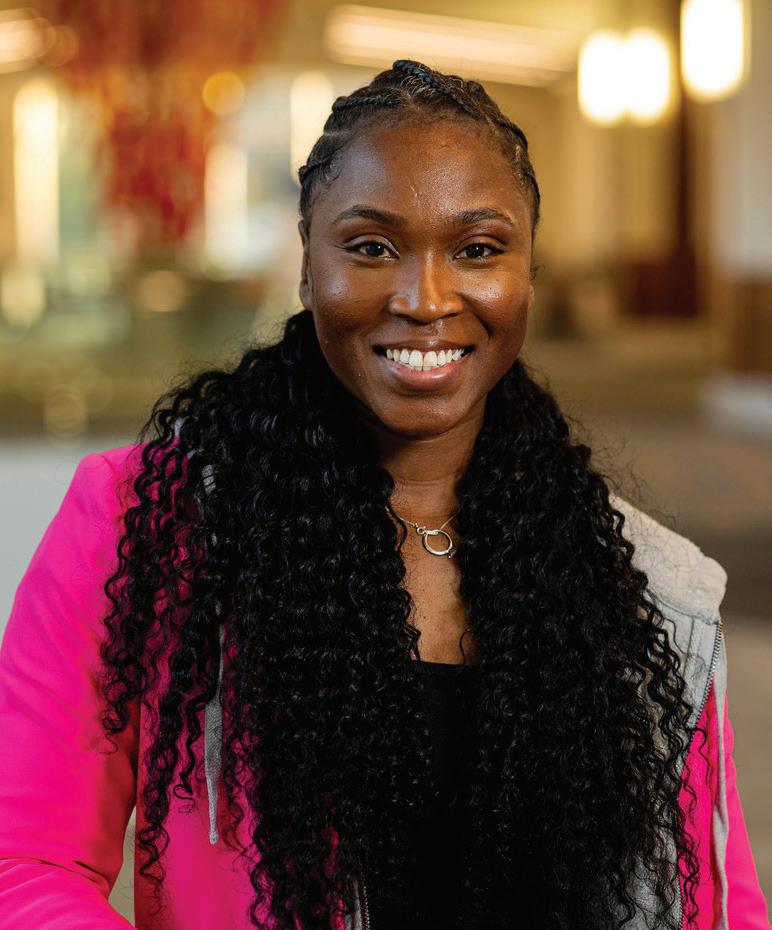
Eleven seniors were named Torchbearers in 2023, the University of Tennessee, Knoxville’s highest undergraduate honor, with two of the 11 being UTCSW students.
Patrick Angelaccio and Evan Mays are both seniors in the College of Social Work and have represented the college as well as the university in profound ways.
The UT College of Social Work soared to new heights in 2023, achieving some remarkable milestones that set a new standard for excellence. Here are just a few of the standout accomplishments. College of Social Work and CEHHS Combine Efforts with Dual-
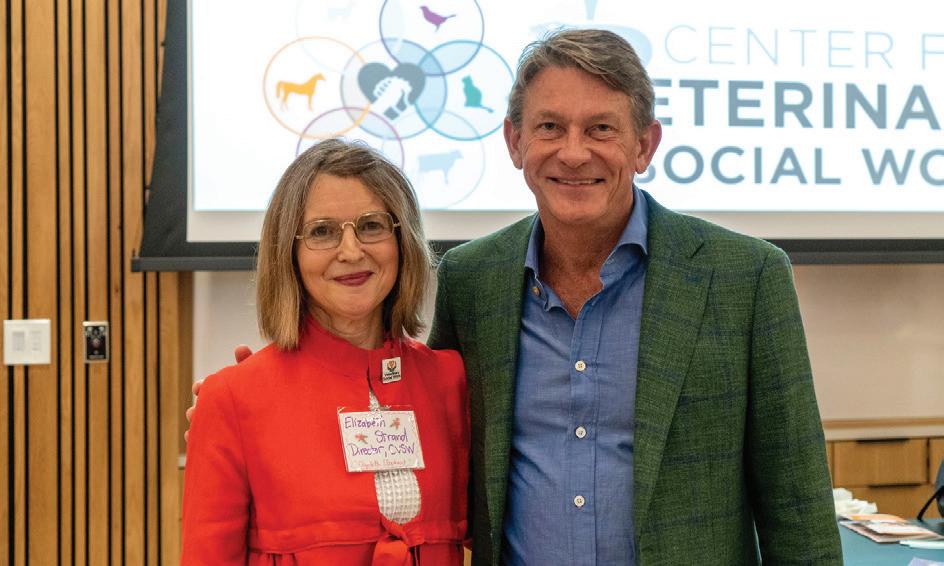
A 37-year collaborative partnership between the College of Social Work and the College of Veterinary Medicine has culminated in the establishment of the Center for Veterinary Social Work. The center focuses on attending to the welfare of all species through excellence in global interprofessional practice. Both colleges share faculty, staff and fiscal responsibility for the creation and functioning of the center as they focus on problems and solutions.
The groundbreaking discipline of Veterinary Social Work was established in 2002 by Dr. Elizabeth Strand, the All Creatures Great and Small Endowed Clinical Associate Professor in Veterinary Social Work.
The University of Tennessee, Knoxville’s graduate and professional student enrollment has grown almost 10% as more students than ever are drawn to the university’s highly regarded academic programs.
Four colleges—the College of Education, Health, and Human Sciences, the College of Social Work, the Haslam College of Business, and the Tickle College of Engineering—have seen double-digit growth since last fall.

UTCSW Honors Student Alice Grosserode was recently awarded a Fulbright Scholarship through the US Student Program. Grosserode will teach English in Latvia, immersing herself in their culture and broadening her international cultural perspective before pursuing a career in social work. Grosserode was one of 17 UT students to receive the prestigious award in 2023.
Dr. Mary Gitau joined the UTCSW as the new Associate Dean for DEI in Fall 2023. The uniqueness of her experience generates a renewed excitement for the college and allows staff, faculty, and students a fresh perspective on DEI and its impact locally, nationally, and globally.

“As an educator and scholar, I strive to impact the world in ways that make life better for those I interact with,” Gitau said. “I have been fortunate enough to impact my students in many ways and my hope is that they will pass that on to the next generation. I have also worked with communities both in the USA and in Kenya and I am a firm believer of giving back and paying forward. My passions range from social justice advocacy and community engagement to engaging in global social issues. I have led university students' short-term study abroad to Kenya where they have collaborated with rural communities in establishing The Community Learning Center Bariki, (Bariki meaning "to bless"), in Kinangop,
As an educator and scholar, I strive to impact the world in ways that make life better for those I interact with.”
— Dr. Mary Gitau Associate Dean for Equity and Inclusion Associate Professor of Practice
Kenya, and establishing the first-ever school library in a rural elementary school also in Kinangop. My personal mission is to inspire, engage, and impact others in ways that enable them to believe in their possibilities, and I feel grateful to have a role in making that happen.”
Born and raised in Kinangop, Kenya, Gitau experienced poverty first-hand and knows the challenges facing rural communities due to limited opportunities, especially for women and children. Because of this, Gitau founded and is president of Gazelle Impact on Women & Youth Kenya, in an effort to break the cycle of poverty and provide opportunities for individuals in rural Kenya to thrive. Gitau embarked on this journey with the belief that education, access to clean water, sustainable farming, and community development are the keys to transforming lives. Their mission is to empower rural communities in Kenya to develop sustainable endeavors that transform them from poverty-stricken communities to self-sustaining. This also provides opportunities for American students to widen their global perspectives and social responsibility, helping to create a brighter future for all. With empowerment as a core value, Gazelle Impact inspires change, one community at a time.
Prior to coming to the UTCSW, Gitau was an associate professor of social work at Clarke University in Dubuque, Iowa. From Iowa to Tennessee, Gitau continues to foster intercultural competency through her training and teaching.
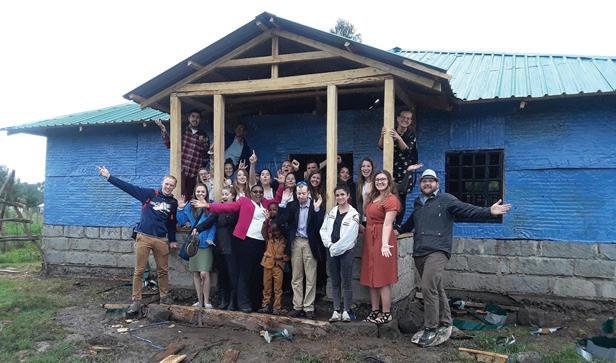
During the pandemic, Assistant Professor Dr. Kristen Ravi along with colleagues, conducted research on Presenting Methodological Resilience for Conducting Research with Vulnerable Populations During Current and Future Pandemics: A Case Study with IPV Shelters and Survivors in the United States. In the research report, Ravi and her team highlighted the challenges that they experienced while attempting to conduct primary data collection with intimate partner violence (IPV) survivors living in an IPV emergency shelter throughout the prolonged COVID-19 pandemic and their strategies to overcome them. Research conducted during the start of the COVID-19 pandemic found an escalation in violence, with some fatal outcomes for people whose lives were entrenched with intimate partner violence. The pandemic prompted higher unemployment rates, lack of income, low social support, isolation, and changes in childcare and school, which are all stressors associated with a higher likelihood of IPV.
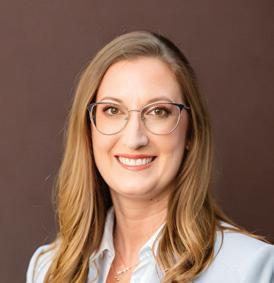
Although the team experienced new and exacerbated challenges conducting research with survivors of IPV due to the pandemic, they were able to implement strategies to continue meaningful research. The strategies included consistent engagement with community partners, triangulating recruitment methods, and expanding our eligibility criteria to include mothers in transitional housing and Spanish speaking mothers. The hope is that these strategies will be beneficial for other scholars who are engaging in research with survivors of IPV and other vulnerable populations during future disruptive events. Full report: Journal of Family Violence, https://doi.org/10.1007/ s10896-023-00499-6
Researching a different angle on people’s wellbeing, Associate Professor Dr. Stacia West proved that guaranteed income improved people’s health during the pandemic. West is a Founding Director of the Center for Guaranteed Income Research (CGIR), along with Dr. Amy Castro, Associate Professor of Social Policy and Practice at the University of Pennsylvania, and coFounding Director of CGIR. CGIR's team led the design and research for the Stockton Economic Empowerment Demonstration (SEED).

As discovered in their research, people who received $500 monthly cash payments for two years as part of SEED reported improved physical health during the COVID-19 pandemic as a result of increased financial assistance, according to the final program evaluation published in the Journal of Urban Health.
The findings build on interim results of the SEED program published in 2021 in which payment recipients prior to the pandemic reported steadier monthly incomes, less anxiety and stress, and an easier time securing full-time employment.
While the program had a greater impact on people’s finances prior to the upheaval caused by COVID-19, the final study — the first to evaluate the program’s full results via peer review — determined that certain noteworthy trends held steady both before and during the pandemic. Participants used the payments to manage risk and support themselves and their families through and beyond the study period. They also reported increased financial independence and selfsufficiency. Full study: https://link.springer. com/article/10.1007/s11524-023-00723-0
In researching mental health during COVID-19, Professor Dr. Michael Mason, with a team of colleagues, led a study on the mental health of young adults during the pandemic. Psychiatric epidemiological evidence estimated that 17% of young adults (aged 18-25 years) experienced a major depressive episode in 2020, relative to 8.4% of all adults aged 26 years or older. Young adults with a major depressive episode are the least likely to receive treatment for depression compared with other age groups.
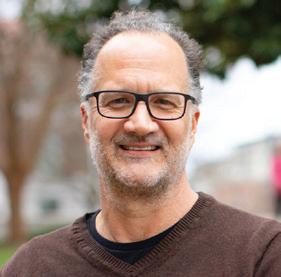
Mason and his team conducted a randomized clinical trial following their initial 4-week SMS text message–delivered cognitive behavioral therapy (CBT-txt) for depression in young adults. Based on participant feedback, outcome data, and the empirical literature, they increased the treatment dosage from 4-8 weeks and tested three mechanisms of change with 103 young adults in the United States. Participants were from 34 states, recruited from Facebook and Instagram, and presenting with at least moderate depressive symptomatology.
Across all three months of the study, participants in the CBT-txt group showed significantly larger decreases in depressive symptoms than those in the control group. Over half of the treatment group moved into the “high-end functioning” category, representing no or minimal clinically significant depressive symptoms, compared with 15% of the control condition. Full study: https://mhealth.jmir.org/2023/1/e45186
The research that UTCSW faculty members conducted during one of the worst times in recent history proved to have a positive and ongoing impact for the future. Whether it be for safety, security, physical, or mental health, people and communities across the country have all benefitted and will continue to benefit from these important findings.
The UTCSW welcomed eight new faculty members at both the Knoxville and Nashville campuses. Additionally, 10 new staff members joined the college in 2023.
ALLISON BUZARD, DSW
Nashville MSSW Program Director and Associate Professor of Practice
Buzard comes to UT from her last role as the Program Director of Social Work and Assistant Professor at Trevecca Nazarene University. She holds a Bachelor of Arts in Social Work with a minor in Spanish from Asbury University, a Master of Social Work from Saint Louis University with a concentration in communities and a certificate in nonprofit administration, and a DSW from the University of St. Thomas. Buzard’s scholarship agenda centers on anti-racist pedagogy within social work education.

ROBERT LUCIO, PHD
Online MSSW Program Director and Associate Professor
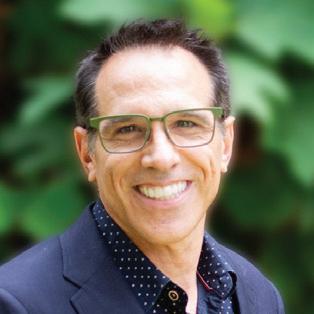
MARY GITAU, PHD
Associate Dean for Equity and Inclusion and Associate Professor of Practice
A graduate of the University of Wyoming, Gitau is an expert on issues of diversity, equity, and inclusion. She comes to UTCSW from Clarke University, where she was Associate Professor in Social Work and Deputy Title IX coordinator. Gitau’s scholarship focuses on restorative practice, DEI issues in the classroom, and working with women in an international context. She founded a nonprofit nongovernmental organization to engage in community and youth development activities in rural Kenya and led study abroad programs for students.

A graduate of the University of South Florida, Lucio served on social work faculties at the University of South Florida and St. Leo University. He has been actively engaged in online education for more than a decade. Lucio’s research focuses on child and youth development, risk and protective factors for mental health, school social work, and social work education. A fluent Spanish speaker, Lucio’s research and practice has included a focus on Latinx populations, including 15 years of practice experience with English- and Spanish-speaking children and their families in home, treatment, and school settings.
EMILY RODRIGUEZ, MSW, LCSW
Assistant Professor of Practice
Rodriguez transitioned from UTCSW staff, where she worked as an advisor and taught the introductory and first year seminar courses, to a full-time faculty member. Prior to that, she worked as a program supervisor at Disc Village in Tennessee and as a mental health care provider at Spring Health (an EAP program), Disc Village, and several mental health settings in Florida.

KATIE BANKS
Administrative Specialist, PhD Program
JODI BAXTER
Administrative Specialist, MSSW Program
BRITTNEY (BEE) CLEVENGER
Academic Advisor
JOHNSON DECEMBRE
Events Coordinator
ELIZABETH HALL
Administrative Specialist, BSSW Program
TAMMY MODIC
Advancement and Alumni
Relations Coordinator
JEN MOORE
Social Media & Digital Content Manager
KRISTEN PEARSON
Academic Advisor
KELSI ROBSON
HR Research Specialist
MARSHA SLIKER
Coordinator of Executive Office
AMY SHIPP, DSW, LCSW
Associate Professor of Practice
Shipp is a Licensed Clinical Social Worker with over 20 years of experience serving children and families, with a particular focus on children who have experienced commercial sexual exploitation. She was the Director of Advocacy Services at the Georgia Center for Child Advocacy, where she oversaw and directed advocacy functions of the Center to ensure provision of quality services for children and their families. Shipp received her BA in Psychology from Auburn University, her MS in Social Work from the University of Texas, Austin, and her DSW from the University of Tennessee College of Social Work.
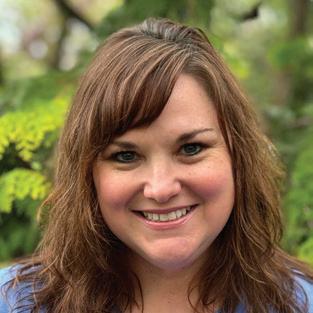
“There are incredible public health implications because we know that financial stress gets into the body and can contribute to anxiety and depression. But more importantly, depression can impact one's ability to show up for family and in the workforce.”
— DR. STACIA WEST, Associate Professor and Founding Director of the Center for Guaranteed Income Research, reporting to CBS News MoneyWatch on how offering free cash helped fight poverty and COVID in one California city.
JENNA SMITH, LCSW
MSSW Online Field Coordinator, Assistant Professor of Practice
Smith received her MSSW from the University of Tennessee College of Social Work’s Nashville program. She has her undergraduate degree in Child and Family Studies from Carson-Newman University. Smith is a Licensed Clinical Social Worker and has a Certification in School Social Work. Her previous work experience includes an Adjunct Faculty position at the UTCSW Nashville campus; a LMSW/Faculty Assistant at Vanderbilt Primary Care and Women’s Health Clinics at Vanderbilt University Medical Center; and an In-Patient Unit Social Worker PRN at Alive Hospice in Nashville.
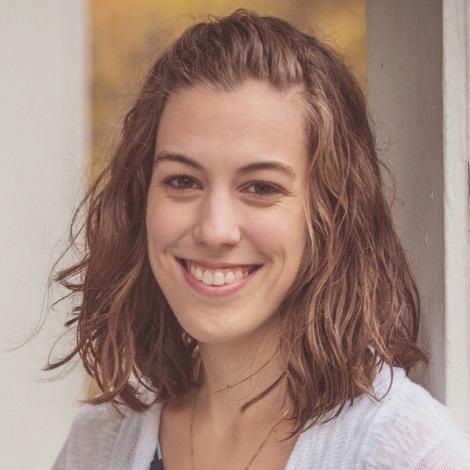
LATAUSHA STEVENSON, LMSW
MSSW Online Field Coordinator, Assistant Professor of Practice
Stevenson has a Master of Science in Social Work from the University of Tennessee, Knoxville, and a Bachelor of Social Work from Middle Tennessee State University. She is an LMSW and is certified in CPR and first aid. Her previous work experience includes serving as a Lecturer/ Supplemental Advisor at the UTCSW Nashville campus; an Admissions Counselor at Asension Saint Thomas Behavioral Health; a Social Work Director at Preston Taylor Ministries; and a Lead Therapist at Camelot Care Centers.

FEI WANG, PHD
Assistant Professor
A 2023 graduate of Case Western Reserve University, Wang studies stress in caregivers for older adults, with special interest in historical trauma affecting caregivers, developmental disabilities, social participation, and resilience. She has experience with interdisciplinary teams in research and practice, with direct practice experience in medical social work. She teaches direct practice and program, and practice evaluation.

“Our vision for the Center for Veterinary Social Work is attending to the welfare of all species through excellence and global interprofessional practice. When we work together, how can we care for all beings not just animals and not just humans?”
— DR. ELIZABETH STRAND, Clinical Associate Professor, Founding Director of Veterinary Social Work at the UTK College of Veterinary Medicine, and All Creatures Great and Small Endowed Professor, discussing with WATE-TV on how the new Center for Veterinary Social Work helps families through grief combining social work and veterinary medicine.
“There was an uptick in understanding about the role of abortion funds when Roe fell. People were so very upset, and they were donating. But I think there’s an attention span issue.”
— DR. GRETCHEN ELY, UTCSW Professor and Director of the PhD Program, sharing with NPR affiliate KMUW in Wichita, Kansas on the topic of declining funds across the country as public attention on reproductive rights and so-called “rage-giving” to abortion funds slows down.
“The poor and people of color have a harder time cooling themselves and paying their electricity bills, but they’re also living in hotter areas.”
— DR. JENNIFER FIRST, UTCSW Assistant Professor, providing information to The Tennessean about heat disparity due to climate change.
“It horrifies me to think of what the families go through when that need is there and cannot be met. Lack of access to veterinary care is a national crisis.”
DR. MICHAEL BLACKWELL, Founder and Director of the Program for Pet Health Equity, explaining to PBS NewsHour how veterinary care access can be approved through costsharing methods.
The McNabb Center, the largest provider of mental health services in East Tennessee, has endowed a scholarship in the University of Tennessee College of Social Work.
The Helen Ross McNabb Center Endowed Scholarship is open to undergraduate and graduate students who have an interest in community mental health. It will provide tuition assistance to two students each year.
“We want to encourage social work students who are considering careers serving in community mental health agencies,” said McNabb CEO and President Mona BlantonKitts.
Blanton-Kitts, who received BSSW and MSSW degrees from the UT College of Social Work, began her career at McNabb as a caseworker. She was named CEO in 2022.
During her tenure, McNabb has charted record growth. The agency now has over 1000 employees serving in 30 counties. Its 15 outpatient centers serve over 45,000 people in East Tennessee.
“The education of professional social workers is essential to our mission of improving the lives of the people we serve,” Blanton-Kitts said. “As the mental health challenges in our area continue to increase, we want to ensure that students have the tuition assistance they need to complete their degrees, enter the workforce, and begin meeting these community needs.”
“We’re grateful for this wonderful new resource for our students,” Dean Lori Messinger said. “We are proud of our long partnership with the McNabb Center and look forward to continued collaboration as we work together to serve our community.”

We want to encourage social work students who are considering careers in community mental health agencies.”
— Mona Blanton-Kitts President and CEO, McNabb Center

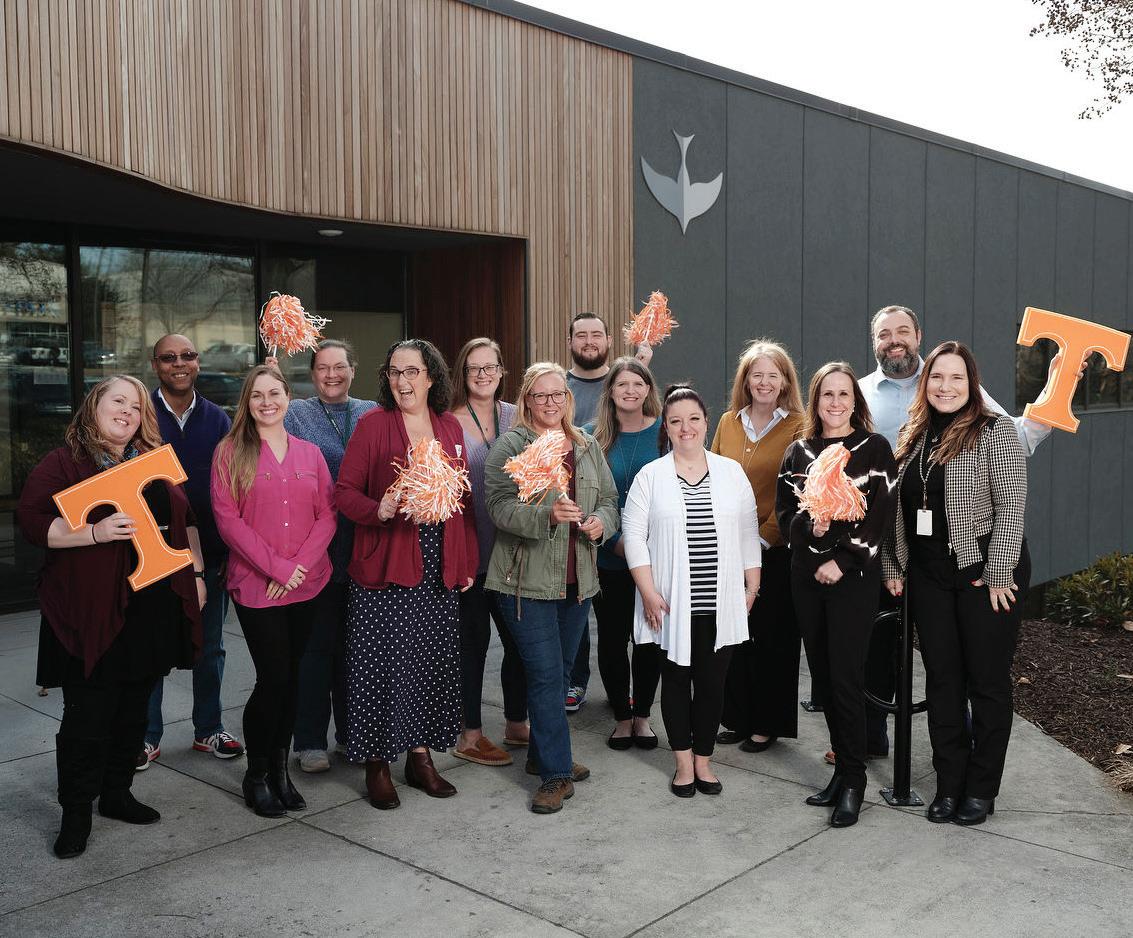

Offering accessible, high-quality education to prepare ethical, effective, skilled social workers for Tennessee and beyond
Doing meaningful research and scholarship that is influential and impacts practice and well-being in the state, the region, the nation, and globally.
Maintaining high-quality connections to alumni, university and community partners, and fostering meaningful collaboration in our work
www.tiny.utk.edu/CSWDONATE
BSSW 2000
MSSW 2004
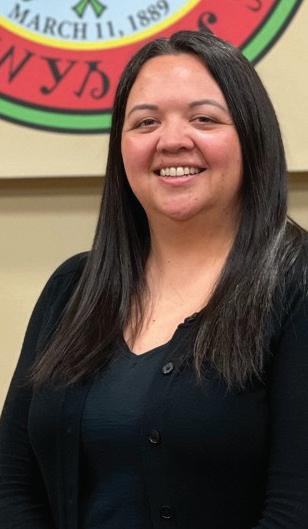
Barbara “Sunshine” Parker currently serves as an Associate Judge for the Eastern Band of Cherokee Indians (EBCI) Tribal Court.
In her role as Associate Judge, Parker oversees a variety of court cases for matters that occur within the territory of the EBCI. These cases range from small claims matters all the way up to major criminal cases such as murder. While she handles all matters of the court, her main focus is on domestic violence court and juvenile court. “I have been working over the last two years on making our domestic violence court more survivor friendly and trying to move cases at a faster pace to keep survivors and the community safe,” Parker said. “Additionally, I am working as part of an integrated team to remodel our approaches to batterers intervention and how we can work with families that want to stay intact and work through the many factors that go into interpersonal violence. I also have worked on launching a juvenile healing to wellness court that takes juveniles who are involved in matters related to substance abuse to work with an integrated team from juvenile services, addressing everything from substance abuse to family dynamics, to getting involved in pro-social activities to increase resilience. This new court will be a year old in January 2024 and has been a welcome addition to our juvenile justice continuum.” Parker affirms that she integrates the skills she learned in her social work program with the skills she learned in her legal education on a daily basis. “I have been lucky enough to work in a government that sees the value of integration and the need to break down the siloing of programs,” she stated. “The reality is that it is not one program or one intervention that will change a person’s
life, it is an entire system and an entire community. I have been able to use all the skills I learned in my various educational pursuits to build integrated systems that help make a healthier community. Mixing social work and law in my education was one the best moves I made as it gave me a large knowledge base that can be used in a variety of settings to help improve systems for the betterment of all.”
While Parker notes that she doesn’t have specific future goals, her overarching goal is always to improve her community by creating or repairing systems so that they best meet the needs of the people they serve. “I am going to keep working as I always have—identify a problem, study the systems that impact that problem, change those systems to better meet needs, and continually adjust as problems or community needs change.”
Staying connected to UT is important to Parker. “I always enjoy coming back to UT to speak with classes and I currently serve on the Alumni Board,” she said. “I also give back with monthly monetary donations to the College of Social Work and College of Law. And of course, I take every opportunity I can to educate potential students on the merits of going to UT for their degree.”
The reality is that it is not one program or one intervention that will change a person's life, it is an entire system and an entire community.”
— Barbara "Sunshine" Parker
UTCSW Alum John Miller recently took on a new role as dean of the University of Louisville’s Raymond A. Kent School of Social Work and Family Science. It is a role that has been in the making for a decade and then some. Miller credits much of his successful career to his time spent getting his PhD at the UTCSW. “Obtaining my PhD from UT has opened every door I've sought throughout my career,” Miller said. “I've been fortunate to work at a variety of institutions (from private and primarily undergraduate, to metropolitan, to R1) as a professor, department chairperson, and now dean. Without the foundation provided during my time at the UTCSW, I would not have the confidence and requisite skills to be successful. I'm especially grateful for mentors I met during my time in Knoxville, primarily Dean Karen Sowers, Dr. John Orme, Terri Orme, and Dr. Stan Bowie.”
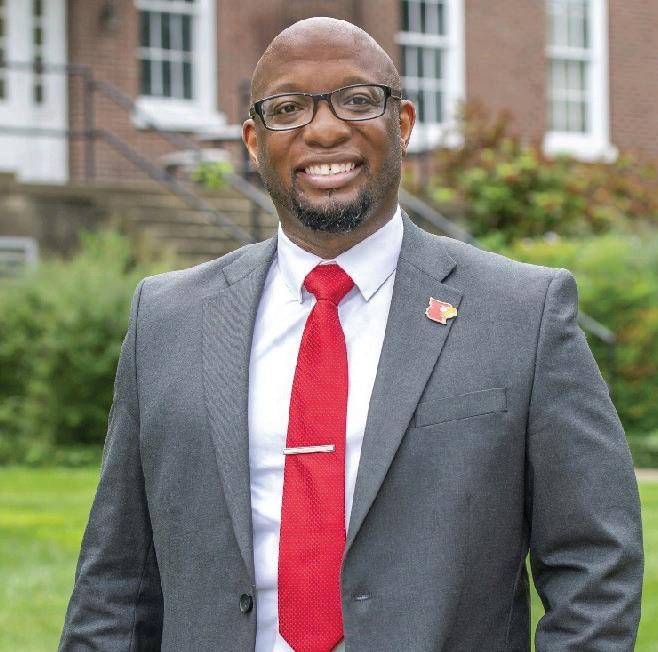
Rebecca Grounsell
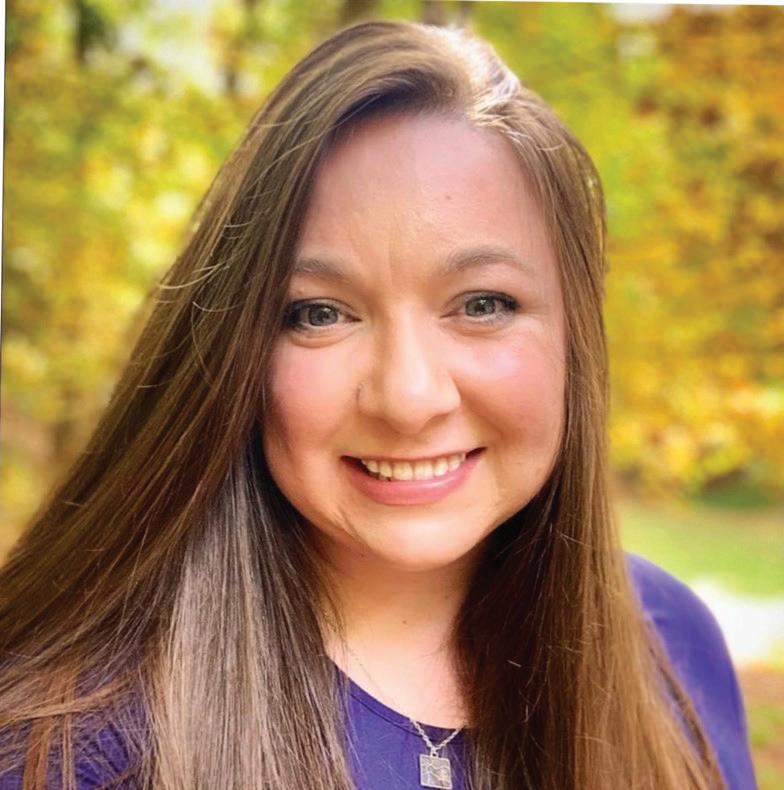
Prior to becoming dean at Louisville, Miller was dean of curriculum and senior diversity officer at St. Norbert College, De Pere, Wisconsin. “The Kent School has a rich tradition of producing exceptional research and dedicated practice and teaching,” Miller said. “I look forward to serving the Kent School as we prepare the next generation of social work and family science leaders.”
Miller, a social worker, professor, scholar, community organizer and consultant, has held previous positions at Benedict College (Columbia, South Carolina) and the University of Arkansas at Little Rock. Among his research interests are the relationship between racism and adverse childhood experiences among African Americans. His textbook, “African American Perspectives: Matters of Consideration for Social Work Practice,” was published in 2017.
When asked about a favorite UTCSW memory, Miller had several to share. “Some of my best memories at the UTCSW were the annual Homecoming Galas,” he stated. “Seeing Social Work celebrated in the community really inspired me. A close second would be the welcome party that Dean Sowers threw at her home to celebrate my doctoral cohort's arrival to the program. She ‘not so gently’ encouraged us to sing "Rocky Top" as a rite of passage. Proudly, I still know the words to this day! That moment made me feel welcomed into the community in a way that's hard to describe. As a first-generation college student, I'll be forever grateful for the warm welcome my colleagues and I received when we entered the program.”
spent the past 17 years as a licensed clinician working in the field of child sexual abuse and childhood trauma. She is passionate about her role as a forensic evaluator, assisting in child abuse investigations by interviewing and assessing children who are suspected victims of sexual abuse, severe physical abuse, psychological abuse, human trafficking, and/or have witnessed violent crimes (including homicides, interpersonal violence, and child fatalities). Forensic evaluators are specially trained to conduct these child-friendly assessments using methods that are legally sound, developmentally appropriate, and trauma-informed. The information gathered during the forensic assessment is treated as evidence in the investigation. Grounsell has conducted approximately 2,000 of these forensic assessments with suspected victims of child maltreatment and has testified many times as both a fact and expert witness in family and general sessions courts. She has spent the past year-and-a-half training her beloved chocolate Labrador (Bear) to earn her therapy dog certification.
Grousnell credits the UTCSW for giving her the knowledge she needed to excel in her career. “The UTCSW did an excellent job of providing guidance and instruction, while also giving me the opportunities to foster independence and develop a starting point for confidence in professional decision-making,” she said. “There have been countless times so far in my career in which I have had to make difficult clinical decisions quickly, rationally, and with confidence in what I know. My time and education from the UTCSW definitely provided the foundation for that skill.”
Grounsell was recently recognized by the University of Tennessee as a “Volunteer 40 Under 40. This important recognition highlights forty alumni under the age of 40 who have excelled personally and professionally since completing their degree at UT Knoxville. “I never expected to be chosen for this, and it was one of the biggest honors of my life,” she explained. “My advice to others, both under and over 40, is to just be kind. Be kind to your clients, to your colleagues, and to yourself. Stay humble and keep an open mind because the cycle of learning/ making mistakes/re-learning never stops. Being kind to yourself means prioritizing your own mental health and doing the work, recognizing your professional worth, advocating for yourself, and setting and maintaining healthy boundaries. This is very hard work that we do, and we must take care of ourselves first in order to do it. Being a social worker means having incredible mental toughness and fortitude. I’m very proud of that.”

Caitlin (Cat) Steele is a driven student currently pursuing a BSSW online. Steele's journey in higher education has been characterized by dedication and a clear sense of purpose. She has her sights set on a master's degree and obtaining a gerontology certificate to further enhance her expertise. Her commitment to her field is evident in her role at the CAC's Office on Aging, where she runs a program that directly serves the elderly population. Her desire to provide the best service possible led her to this career path.
Steele's choice of a degree in social work is deeply rooted in her innate desire to help people. Her early experiences and role as a social worker in her family fueled her commitment to making a positive impact and helping others. The UT College of Social Work was a natural choice for her, being both a prestigious program and local to her. She has found a supportive community within the college and believes that the institution genuinely cares about her education.
“After graduation, I envision a career in research and aspire to become a faculty member at a respected institution like the University of Tennessee,” Steele said. “Additionally, I would like to write a book and travel the country, sharing knowledge about social justice in an effort to raise awareness.”
To Steele, social work embodies being on the right side of history. She views social work as a way to promote equity and justice for all individuals, whether through policy advocacy, nonprofit work, or providing essential mental health support. Her experience in the program has solidified her belief that social work is the framework for personal growth and for assisting others in their own evolution.

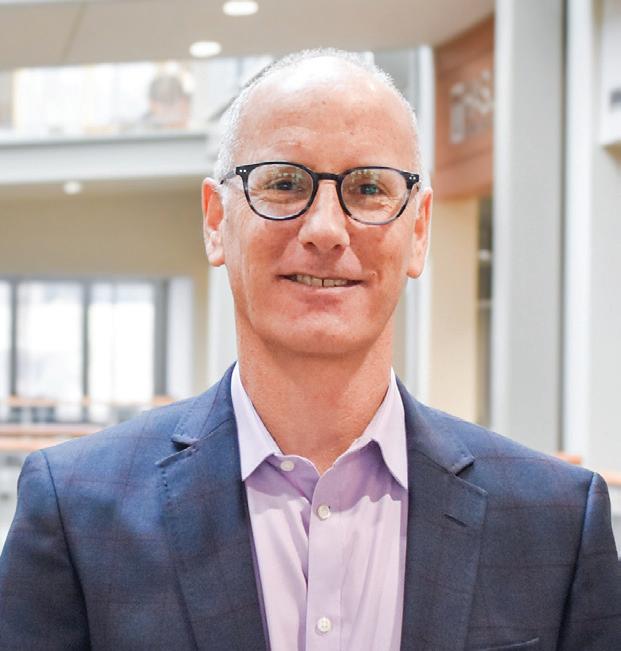
Jim Rosenberg is in his first year of the clinical track in the MSSW extended program. He is currently lecturer in the Healthcare Division of the Graduate and Executive Education Division of the UT Haslam College of Business where he designs and guides leadership and management programs for healthcare organizations.
Rosenberg felt like he was “coming back home” to focus again on how people, families, and systems function and how we can help people overcome challenges and thrive. “I studied psychology and neuroscience as an undergraduate many years ago,” he explained. “My interest always remained on people and how we can create better solutions for people. It is exciting to be focused again on the root of things; to be talking about and learning to help people with challenges that are at the core of their well-being and happiness. I also am really enjoying being in a community here who care so much about these questions. The conversations with our faculty and with my classmates are great, and so are the simulations and exercises. I feel like I gain new perspectives from my classmates every week. This work requires lots of practice and I appreciate having this group to practice and learn with.”
In deciding to pursue his degree in social work, Rosenberg’s background played an important factor. “I completed a coaching program about four years ago and have worked with professionals on their leadership and career development,” he said. “I found the conversations always came around to questions about self. I also found that the most effective techniques in working with people were therapybased. I found it tremendously rewarding to facilitate someone’s learning and growth this way. Seeing this impact and looking at this experience through the lens of my own experiences, I decided I wanted to work with people on a broader range of goals and challenges in their lives, be more deeply skilled at it, and make this the focus of my professional work. I feel like we can spend a lot of our energy on trivial concerns in this world, and I would like to spend my time working with people on things that really matter to them. All of this brought me to the MSSW program to develop the skills and experience to do that work.”
After graduating Rosenberg plans to earn his LCSW and work as a therapist in a private practice.
Amy Shipp is a Licensed Clinical Social Worker and an Assistant Professor of Practice at the UTCSW. She is in her third and final year of the DSW program and will graduate in May 2024.

Shipp has particularly enjoyed forming lasting relationships with her cohort. “My cohort are a remarkable group of humans,” Shipp said. “Their collective social work knowledge and skills are immeasurable, and it has been a privilege to learn from and with them. I have also enjoyed the variety of content within the program, as it has helped me broaden my clinical, research, and leadership skills. The faculty have been supportive and encouraging while also respectful of the experiences we bring to the table."
Shipp was initially drawn to the DSW program because of her commitment to lifelong learning.
“This profession is always evolving, and I felt a DSW was specifically in line with my desire to further advance my skill set as a clinician, educator, and supervisor,” she stated. “When I began the DSW program, my primary goal upon graduation was to transition from nonprofit work into a full-time faculty position in a reputable college of social work, preferably at a large university near mountains. When I learned about the open position here at UTK, I was simultaneously thrilled and overwhelmed by the possibility of reaching my goal earlier than expected. I have loved being a social worker for the past 22 years, and I am so excited to bring that experience into the classroom. I also enjoy learning from my students, and I look forward to welcoming them into the profession.”
KENYETTE GARRETT PhD
PhD student Kenyette Garrett has a bachelor’s degree in social work from Methodist University and a master’s degree in social work from the University of North Carolina, Chapel Hill. Garrett’s 14-year career in social work has included working in child welfare, and community mental health. She has also taught as an adjunct professor. Garrett is licensed in North Carolina.
Garrett has a long-time interest in expanding the scope of the field and searching for evidence-based solutions to problems that have historically affected disenfranchised populations. “I feel especially compelled to explore strengthbased interventions focused on empowering and enriching the lives of parents raising children of color without the support of an active co-parent,” she said. “Because of this, my research interests include trauma and resilience, access to arts education, attachment theory, and post traumatic growth.”
Garrett recently represented the UTCSW at the Community Engagement Academy Summer Intensive Cohort. “The Community Engagement Academy provided the opportunity to get a better understanding of the rich history of Knoxville and the issues that individuals in the community are dealing with,” she explained. “My favorite part of the experience was learning from and connecting with doctorate students from other departments. It was particularly meaningful for me to have the opportunity to cultivate relationships with other students who are women of color.”
As an educator, Garrett plans to incorporate community engagement into the curriculum whenever possible. “I feel it is crucial to our work in the social work profession, particularly as it relates to being of service to disenfranchised individuals,” she stated. “I have also been sharing what I have learned with my colleagues and encouraging them to explore the history and culture of the Knoxville community.”
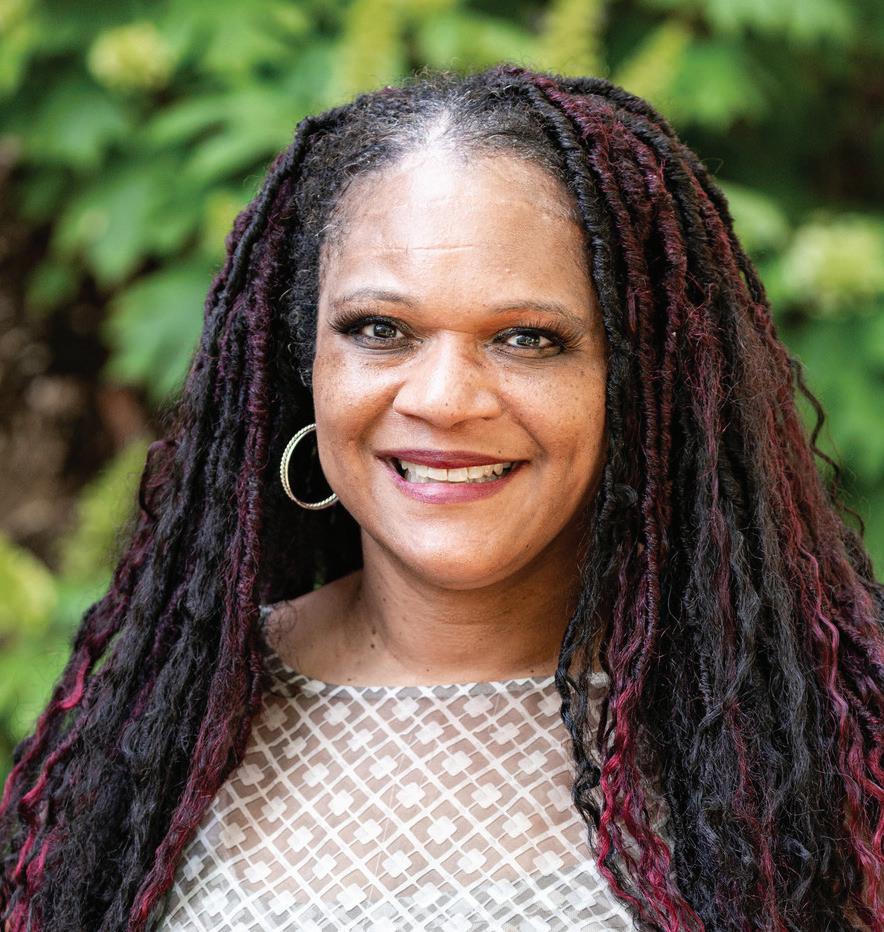
Burow, D., Ellis, K., & First, J. (2023). Intended response to tornado watches among Tennessee residents. Weather, Climate, and Society, 15, 59-73. https://doi.org/10.1175/WCAS-D-22-0066.1
Chen, Z., O’Brien, M., Nielsen, S., Zheng, H., & Starks, B. (2023). A cross-sectional examination of educational expectation among welfare users in an asset building program. Global Social Welfare. https://doi.org/10.1007/s40609-023-00263-0
Conway, A., *Garrett, K., Granger, P., Bamwine, P., & Gavin, A. (2023). Child emotional abuse and adult depressive symptoms in a nationally representative sample of Black females: The moderating role of adolescent sleep duration. American Journal of Orthopsychiatry, 94(2), 180-189. https://doi.org/10.1037/ort0000713
Garland, B.H., Mindrup, R.M., Zottarelli, L.K., & McCarley, J.D. (2023). Effects of a same-day post-detoxification residential alcohol use disorder treatment admission policy. Journal of Social Work Practice in the Addictions, 23(2), 65-75. https://doi.org/10.1080/153325 6X.2021.1996839
Hogue, A., Bobek, M., Porter, N., MacLean, A., Wenzel, K., Fishman, M., Coatsworth, J.D., & Langer, D.A. (2023). Launching relationshiporiented behavioral services for youth opioid use disorder: Innovations in medication decision-making and adherence planning. Child & Family Behavior Therapy, 45(3), 199-225. https:// doi.org/10.1080/07317107.2023.2172704
Joseph-McCatty, A.A., & Hnilica, R.J. (2023). Restorative practices: The application of restorative circles in a case study school. Teaching and Teacher Education, 121 https://doi.org/10.1016/j. tate.2022.103935
Ravi, K.E., Cronley, C., *Lawler, A., & Held, M.L. (2023). Presenting methodological resilience for conducting research with vulnerable populations during current and future pandemics: A case study with IPV shelters and survivors in the United States. Journal of Family Violence. https://doi.org/10.1007/s10896-023-00499-6
Ravi, K.E., Leat, S.R., Voth Schrag, R., & Moore, K. (2023). Factors influencing help-seeking choices among non-service-connected survivors of IPV. Journal of Family Violence. https://doi.org/10.1007/ s10896-023-00495-w
Rodriguez, S.C., Guerra, P.P., & Galvez, E. (2023). Platicas with Latinx pre-service teachers: Insights about navigating teacher education in the new Latinx south. Journal for Multicultural Education, (17)2, 212222. https://doi.org/10.1108/JME-07-2022-0085
Russell, M.A., Coatsworth, J.D., Brown, A., Zaharakis, N., Mennis, J., Rodriguez, G.C., & Mason, M.J. (2023). Peer network counseling effects on substance use: An individual participant data metaanalysis integrating three randomized controlled trials. Prevention Science, 24(8), 1510-1522. https://doi.org/10.1007/s11121-02201468-z
Saleh, M.F., Bowland, S., & Colvin, A.D. (2023). Fostering a dual vision: lessons learned in developing a collaborative joint MSW program. Social Work Education https://doi.org/10.1080/02615479 .2022.2162874
Alspaugh, A., Swan, L.E.T., Auerbach, S.L., Bartmess, M., Agbemenu, K., & Ely, G.E. (2023). Mistreatment in health care among women in Appalachia. Culture, Health, Sexuality, 25(12), 1690-1706. https://doi. org/10.1080/13691058.2023.2176547
Berg, K.A., Ishler, K.J., Lytle, S., Kaplan, R., Wang, F., Olgac, T., Miner, S., Edguer, M.N., & Biegel, D.E. (2023). Don’t promise something you can’t deliver: Caregivers advice for improving services to adolescents and young adults with autism. Autism Research and Treatment. http://doi.org/10.1155/2023/6597554
Cronley, C., *O'Dell, A., Fields, N., Mattingly, S.P., Iroz-Elardo, N., Highfill, M.C., Cole, R., & Stringfellow, M.K. (2023). Designing and evaluating a smartphone app to increase underserved communities’ data representation in transportation policy and planning. Transportation Research Interdisciplinary Perspectives, 18(1), 1-8. https://doi.org/10.1016/j.trip.2023.100763
Mennis, J., Stahler, G.J., & Mason, M.J. (2023). Cannabis legalization and the decline of cannabis use disorder (CUD) treatment utilization in the US. Current Addictions Reports, 10, 38-51. https://doi.org/ 10.1007/s40429-022-00461-4
West, S., Castro, A., & Doraiswamy, P.M. (2023). Recurring cash transfers to enhance the mental wellbeing of Americans. Nature Mental Health 1, 148–150. https://doi.org/10.1038/s44220-02300025-z
Mason, M.J., Coatsworth, J.D., Zaharakis, N., Russell, M., Wallis, D., Brown, A., & Hale, C. (2023). Treating young adult depression with text-delivered cognitive behavioral therapy: A pilot randomized clinical trial. Behavior Therapy, 54(2), 315-329. https://doi. org/10.1016/j.beth.2022.09.005
Sloboda, Z., Johnson, K.A., Fishbein, D.H., Brown, C.H., Coatsworth, J.D., Fixsen, D.L., Kandel, D., Paschall, M.J., Silva, F.S., Sumnall, H., & Vanyukov, M. (2023). Normalization of prevention principles and practices to reduce substance use disorders through an integrated dissemination and implementation framework. Prevention Science, 24(6), 1078-1090. https://doi.org/10.1007/s11121-023-01532-2
Thomas, V., Bowie, S.L., & *Ward, C. (2023). Assessing the impact of religious values on social bonds among African American adults: Implications for social work practice. Journal of Religion & Spirituality in Social Work: Social Thought, 42(2), 259-278. https://doi.org/10.1080/15426432.2023.2200363
West, S., & Castro, A. (2023). Impact of guaranteed income on health, finances, and agency: Findings from the Stockton randomized controlled trial. Journal of Urban Health 100, 227–244. https://doi.org/10.1007/s11524-023-00723-0
Doherty, M., Heintz, J., Leader, A., Wittenburg, D., Ben-Shalom, Y., Jacoby, J., Castro, A., & West, S. (2023). Guaranteed income and financial treatment trial (GIFT Trial or GIFTT): A 12-month, randomized controlled trial to compare the effectiveness of monthly unconditional cash transfers to treatment as usual in reducing financial toxicity in people with cancer who have low incomes. Frontiers in Psychology, 14 https://doi.org/10.3389/ fpsyg.2023.1179320
Huslage, M., Ely, G.E., Nugent, W.R., Auerbach, S., & Agbemenu, K. (2023). Reproductive autonomy in Appalachia: An investigation into perceived contraceptive pressure. Journal of Interpersonal Violence, 38(9-10), 6985-7011. https://doi. org/10.1177/08862605221140035
(cont'd)
Irani, E., Wang, F., Griggs, S., & Hickman, R.L. (2023). Resilience as a moderator of role overload and sleep disturbance among caregivers of persons with dementia. Geriatric Nursing, 51, 49-53. https://doi. org/10.1016/j.gerinurse.2023.02.014
McGarity, S.V., & Morris, Z.A. (2023). People with disabilities and COVID-19 economic impact payments. Journal of Poverty, 27(2), 185-196. https://doi.org/10.1080/10875549.2022.2080029
McQueen, S.S., Huguley, J.P., Haynik, R., Joseph-McCatty, A.A., Calaman, R., Williams, M., & Wang, M.T. (2023). Teacher perspectives on effective restorative practice implementation: Identifying programmatic elements that promote positive relational development in schools. Child & Youth Services. https://doi.org/10.1 080/0145935X.2023.2191943
Phillippo, K., Lucio, R., Shayman, E., & Kelly, M. (2023). “Why wasn’t I doing this before?”: Changed school social work practice in response to the COVID-19 pandemic. Qualitative Social Work, 22(3), 431-447. https://doi.org/10.1177/14733250221076061
Qin, W., Nguyen, A.W., Wang, Y., Hamler, T.C., & Wang, F. (2023). Everyday discrimination, neighborhood perceptions, and incidence of activity limitations among middle-aged and older African Americans. The Journals of Gerontology: Series B, 78(5), 866-879. https://doi.org/10.1093/geronb/gbad001
Chaffin, K., & Shatila, S. (2023). The case for online education: Success factors in an MSW program through a critical feminist lens. Social Work Education https://doi.org/10.1080/02615479.202 3.2221992
Hobbs, S., Bellows, L.L., Coatsworth, J.D., & Johnson, S.L. (2023). Using plan, do, study, act cycles to improve a maternal self-care intervention with audience input. Health Promotion Practice. Advance online publication. https://doi.org/10.1177/ 1524839923117730
Naseh, M., Held, M.L., Gilbertson, A., Shrestha, L. (2023). Multidimensional deprivation amongst refugees in the USA. The British Journal of Social Work, 53(4), 2120-2139. https://doi. org/10.1093/bjsw/bcac200
Yuan, F., Proctor, L., Blackburn, J., Bray, R., *Mukherjee, N., Bowland, S., Lopez, R.P., Li, S., & Zhao, X. (2023). A case study on AI and robot-assisted psychoeducational support for Alzheimer’s caregivers. Alzheimer’s & Dementia, 19(S5). https://doi.org/10.1002/ alz.066861
Zottarelli, L.K., Xu, X., Sunil, T.S., & Chowdhury, S. (2023). Just plain hot: Examining summer daily high heat indices and communitylevel social vulnerability on emergency medical services on-scene responses in San Antonio, Texas, 2015-2018. Cureus, 15(6). https:// doi.org/10.7759/cureus.39914
Campbell, M., Lucio, R., Cashwell, S.T., & Cowser, J. (2023). A mixed-methods study of applied team integration for opioid use disorder treatment in rural settings. Journal of Social Work Practice in the Addictions, 23(3), 216-229. https://doi.org/10.1080/153325 6X.2022.2054155
Heffron, L.C., Held, M.L., & Huslage, M. (2023). Immigration in social work education: Student knowledge and perception of risk of detention and deportation. Journal of Social Work Education, 60(1), 59-72. https://doi.org/10.1080/10437797.2023.2228855
*Lee, S., & First, J.M. (2023). Investigation of the microenvironment, land cover characteristics, and social vulnerability of heat-vulnerable bus stops in Knoxville, Tennessee. Sustainability. 15(14). https://doi. org/10.3390/su151410866
*Lee, S., & First, J.M. (2023). Risk and protective factors associated with post-tornado distress among persons with disabilities. Journal of Loss and Trauma, 29(1), 95-113. https://doi.org/10.1080/15325024 .2023.2236010
Ravi, K.E., Rai, A., & Lindsey, S. (2023). Systematic review of the psychometric properties of culturally responsive domestic violence measures. Trauma, Violence, & Abuse, 24(3), 1560-1578. https://doi. org/10.1177/15248380211073844
Schwartz, A., Meschke, L.L., Tree, J.J., Brown, K., & Coatsworth, J.D. (2023). Beating trauma: Physical activity to promote resilience against substance use. Drug and Alcohol Dependence, 248, Article 109942. https://doi.org/10.1016/j.drugalcdep.2023.109942
Weaver, R.H., Bolkan, C., Coatsworth, J.D., & Hill, L.G. (2023). Introduction to the special issue: Toward a lifespan prevention science - A Focus on middle and late adulthood. Prevention Science, 24, 799–807. https://doi.org/10.1007/s11121-023-01555-9
Chavez, B., Lucio, R., Sosa, L.V., & Vaquera, E. (2023). The reality of a journey: What school social workers need to know about the experiences of Latinx undocumented youth. Journal of Ethnic & Cultural Diversity in Social Work, 32(4), 223-234. https://doi.org/10.1 080/15313204.2021.1964121
First, J.M., Shin, H., Figueroa-Caballero, A., Okker-Edging, K., Spialek, M.L., & Houston, J.B. (2023). Posttraumatic stress related to Orlando nightclub shooting: LGBTQ identity and media use. Journal of Loss and Trauma 28(4), 298-314. https://doi.org/10.1080/15325024.202 2.2116823
*Scoresby, K., Journey, C., *Fackler, A., Tran, C.V., Nugent, W., & Strand, E. (2023). Relationships between diversity demographics, psychological distress, and suicidal thinking in the veterinary profession: A nationwide cross-sectional study during COVID-19. Frontiers in Veterinary Science, 10 https://doi.org/10.3389/ fvets.2023.1130826
Aguilera, N. B., Thompson, P., Patterson, D., Lucio, R., Springer, D., & Ochocki, S. (2023). Improving current functioning and preventing future abuse: Exploring outcomes of the nurturing parenting program with adolescents. Families in Society, 104(3), 278-291. https://doi.org/10.1177/10443894221146842
Allen, A., Ravi, K., Haselschwerdt, M., & Niederhauser, V. (2023). The experiences and perceptions of campus resource utilization by university students with childhood domestic violence exposure histories. Research Square. https://doi.org/10.21203/ rs.3.rs-3385500/v1
Auerbach, S., Agbemenu, K., Lorenz, R., Hequembourg, A., & Ely, G.E. (2023). Contraceptive behavior in Appalachia: Exploring use, nonuse, and contraceptive attitudes. International Journal of Environmental Research and Public Health. 20(19), 6862. https://doi. org/10.3390/ijerph20196862
Chaffin, K. (2023). Online graduate social work education and critical feminist perspectives: An educational framework. Journal of Teaching in Social Work, 43(4), 496-512. https://doi.org/10.1080/08 841233.2023.2248211
First, J.M., & *Lee, S. (2023). Examining factors influencing protective actions among persons with disabilities during the December 10–11, 2021, tornado outbreak in the United States. Disaster Medicine and Public Health Preparedness, 17(474). https://doi.org/10.1017/dmp.2023.150
Mennis, J., Mason, M.J., Coatsworth, J.D., Russell, M.A. & Zaharakis, N. (2023). Young adult depression and cannabis use: Associations before and after recreational legalization. American Journal of Preventive Medicine, 66(2), 333-341. https://doi.org/10.1016/j. amepre.2023.09.023
Rai, A., Held, M.L., & Vidal de Haymes, M. (2023). Afghan refugee resettlement in the United States: Implications for service provision. Families in Society, 104(3), 392-396. https://doi.org/10.1177/ 10443894221122581
Sonsteng-Person, M., Spoth, A.P., Hostetter, R., Akapnitis, I., Barbera, R., Joseph, A.A., Mackey, C., & Garcia-Perez, J. (2023). A new world cannot be built alone: An abolitionist framework for collective action in social work. Abolitionist Perspectives in Social Work, 1(1). https:// doi.org/10.52713/apsw.v1i1.18
Swan, L.E.T., Senderowicz, L.G., Lefmann, T., & Ely, G.E. (2023). Health care provider bias in the Appalachian region: The frequency and impact of contraceptive coercion. Health Services Research, 58(4), 772-780. https://doi.org/10.1111/1475-6773.14157
Abrams, T.E., Nugent, W.R., Joseph-McCatty, A.A., & *Moulick, A. (2023). Examining disparities in alcohol use testing on burn patient admissions: A call for association guidance. Journal of Burn Care & Research, 45(2), 416-424. https://doi.org/10.1093/jbcr/irad166
Basra, I.K., Kenney, T., Forrest-Bank, S., Zottarelli, L.K., & Raghavan, C. (2023). Predatory helpfulness: An empirical framework to identify fraudulent tactics used by pimps to recruit and commercially sexually exploit young girls and women. Journal of Human Trafficking https://doi.org/10.1080/23322705.2023.2259263
Chen, Z., Birkenmaier, J., & Garand, J. (2023). Examining the validity of financial knowledge measures in a context of racialized financial market. Race and Social Problems, 16, 86-98. https://doi. org/10.1007/s12552-023-09398-3
Conway, A., & Miller, A.L. (2023). Social jetlag longitudinally predicts internalizing and externalizing behavior for adolescent females, but not males. Chronobiology International, 40(10), 1404-1418. https:// doi.org/10.1080/07420528.2023.2265480
Elliott, W., Sorensen, N., O’Brien, M., Chen, Z., Starks, B., & Zheng, H. (2023). The impact of grocery store rewards cards on saving and asset accumulation in children’s savings account programs. Journal of the Society for Social Work and Research, 14(4). https://doi. org/10.1086/717105
Irani, E., Wang, F., Meyer, K., Moore, S.E., & Ding, K. (2023). Social activity restriction and psychological health among caregivers of older adults with and without dementia. Journal of Aging and Health, Advance online publication. https://doi.org/10.1177/ 08982643231209089
Mason, M.J., Coatsworth, J.D., Zaharakis, N., Russell, M., Brown, A., & McKinstry, S. (2023). Testing mechanisms of change for text message–delivered cognitive behavioral therapy: Randomized clinical trial for young adult depression. JMIR Mhealth and Uhealth, 11. Article e45186. https://doi.org/10.2196/45186
Ricciardelli, L., McGarity, S.V., Mbao, M., Erbetta, K., Herzog, J., & Knierem, M. (2023). Racial disparity in social work professional licensure exam pass rates: Examining institutional characteristics and state licensure policy as predictors. Journal of Evidence-Based Social Work, 21(2), 199-213. https://doi.org/10.1080/26408066.202 3.2285887
*Ward, C., Johnson, I., Bamwine, P., & Light, M. (2023). The pet paradox: Uncovering the role of animal companions during the serious health events of people experiencing homelessness. Anthrozoös, 37(2), 343-359. https://doi.org/10.1080/ 08927936.2023.2280376
Alcantar, N.A., Cronley, C., Fields, N., Fogel, S.J., Mattingly, S., & Nordberg, A. (2023). Preparing students to address the grand challenges for social work: Researching, teaching, and practicing interdisciplinary collaboration. Journal of Social Work Education, 59(1), S1-S4. https://doi.org/10.1080/10437797.2023.2274742
Brown, M.J., Adkins-Jackson, P.B., Sayed, L., Wang, F., Leggett, A., & Ryan, L.H. (2023). The worst of times: Depressive symptoms among racialized groups living with dementia and cognitive impairment during the COVID-19 pandemic. Journal of Aging and Health, Advance online publication. https://doi. org/10.1177/08982643231223555
Conway, A., *Garrett, K., Granger, P., Bamwine, P., & Gavin, A. (2024). Child emotional abuse and adult depressive symptoms in a nationally representative sample of Black females: The moderating role of adolescent sleep duration. American Journal of Orthopsychiatry, 94(2), 180–189. https://doi.org/10.1037/ort0000713
Huslage, M., Held, M. L., & Rai, A. (2023). Assessing mental health vulnerability among first- and second-generation immigrants during the Trump Administration. Families in Society, 104(4), 541556. https://doi.org/10.1177/10443894231180647
Nugent, W.R., Daugherty, L., & *Moulick, A. (2023). A measurement equivalence study of English and Spanish versions of the family bondedness scale. Human-Animal Interactions, 11(1). https://doi. org/10.1079/hai.2023.0043
Wang, F., Irani, E., Tian, M.C., & Yi Lau, M.M. (2023). The mediating effect of caregiving relationship quality on the association between caregiving stressors and mental health problems among older spousal caregivers. The International Journal of Aging and Human Development. 97(4):435-455. https://doi. org/10.1177/00914150221143959
Zettler, H., Schauss, E., Williams, R., Hawes, K., Conway, A., Allen, S., Rashed, J., Ahern, B., Li, C., Burgess, M., Bartelli, D., Neal, M., & Loveless, C. (2023). Correlates of intentional and unintentional firearm-related injuries among pediatric hospital patients. Journal of Aggression, Maltreatment, and Trauma, 1-17. https://doi.org/10.1080 /10926771.2023.2293099
* Indicates UTCSW student
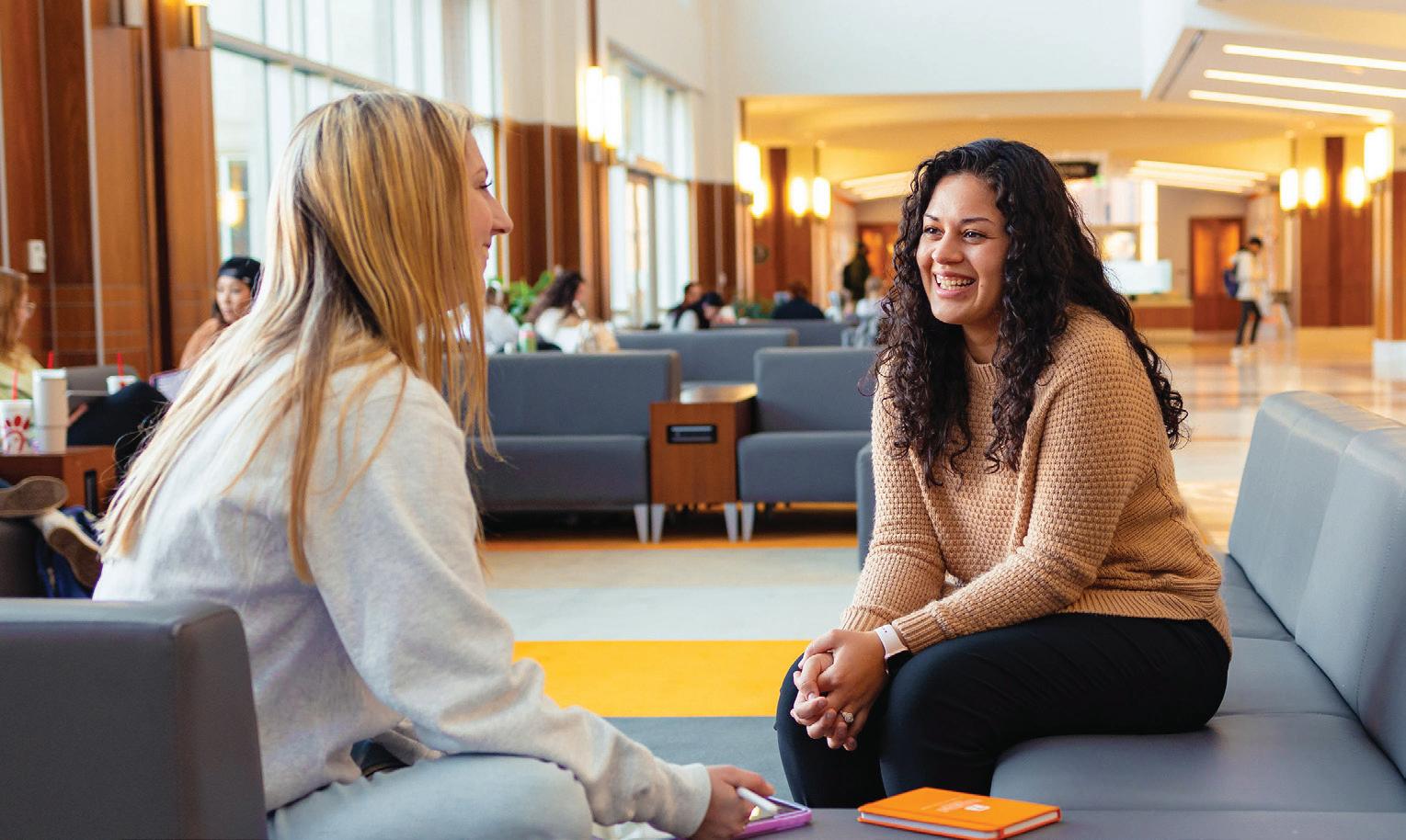
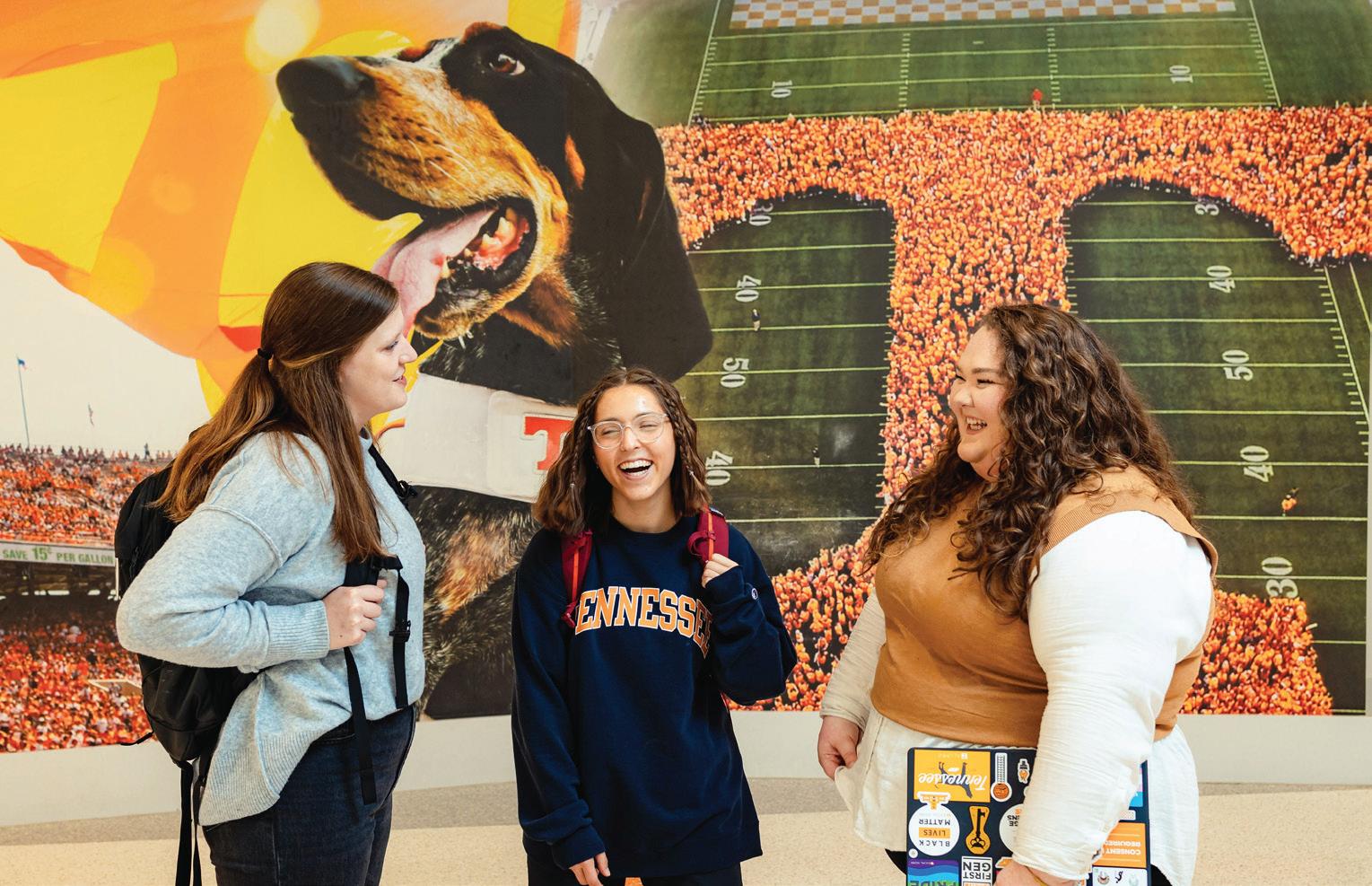
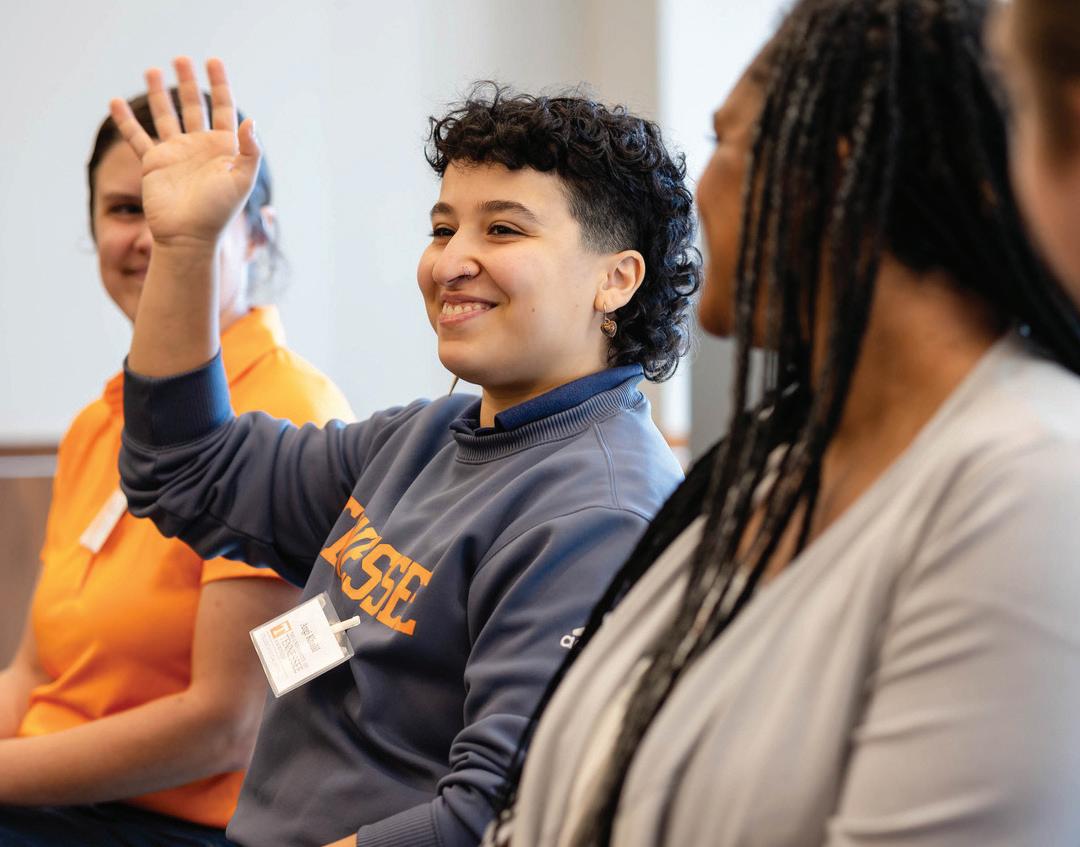
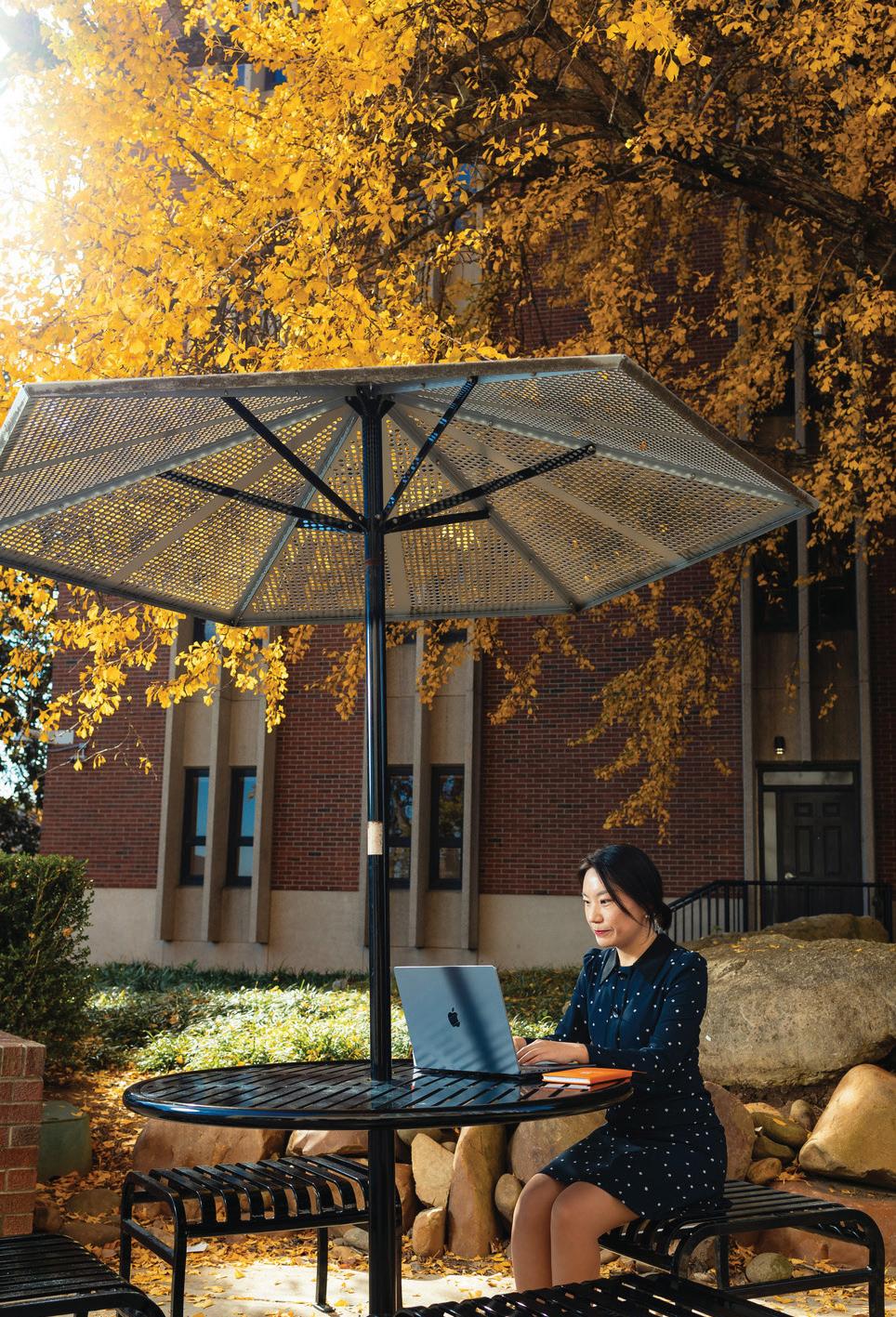

U.S. POSTAGE PAID PERMIT NO. 481 KNOXVILLE, TN
916 Volunteer Blvd.
Stokely Management Center
Knoxville, TN 37996
865-974-2809
csw.utk.edu
The University of Tennessee is an EEO/AA/Title VI/Title IX/Section 504/ADA/ADEA institution in the provision of its education and employment programs and services. All qualified applicants will receive equal consideration for employment and admission without regard to race, color, national origin, religion, sex, pregnancy, marital status, sexual orientation, gender identity, age, physical or mental disability, genetic information, veteran status, and parental status. A project of the College of Social Work Communications Department with assistance from Nathanna Design. Photography by Shawn Poynter, Poynter Photo Co. PAN: E01-4013-004-24
